#words do not feel like words anymore
Text
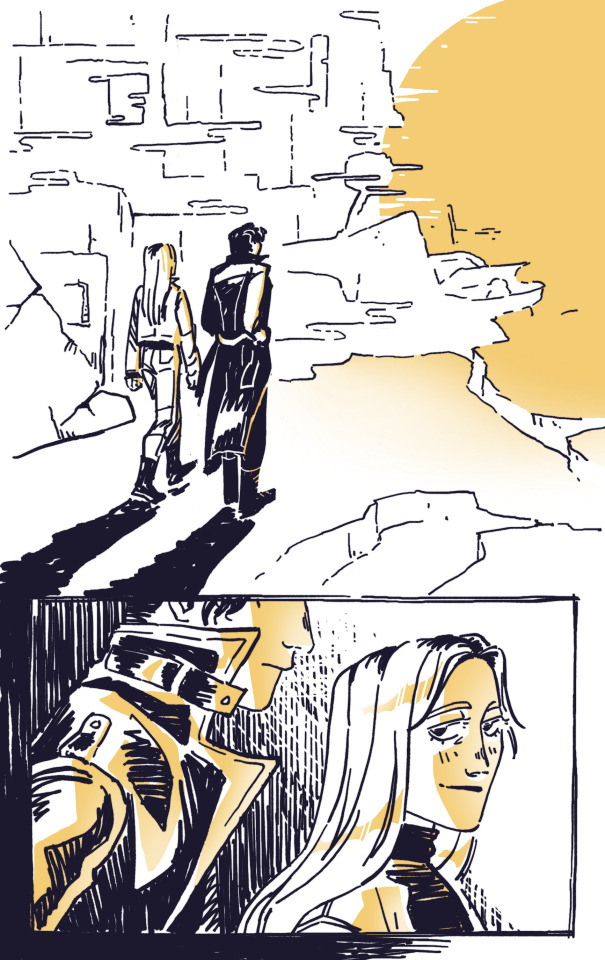
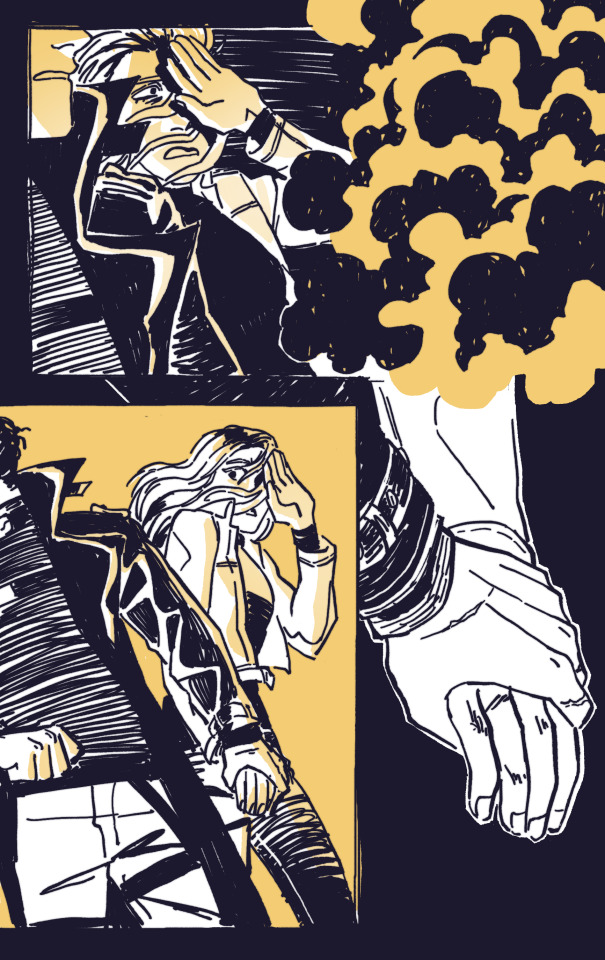


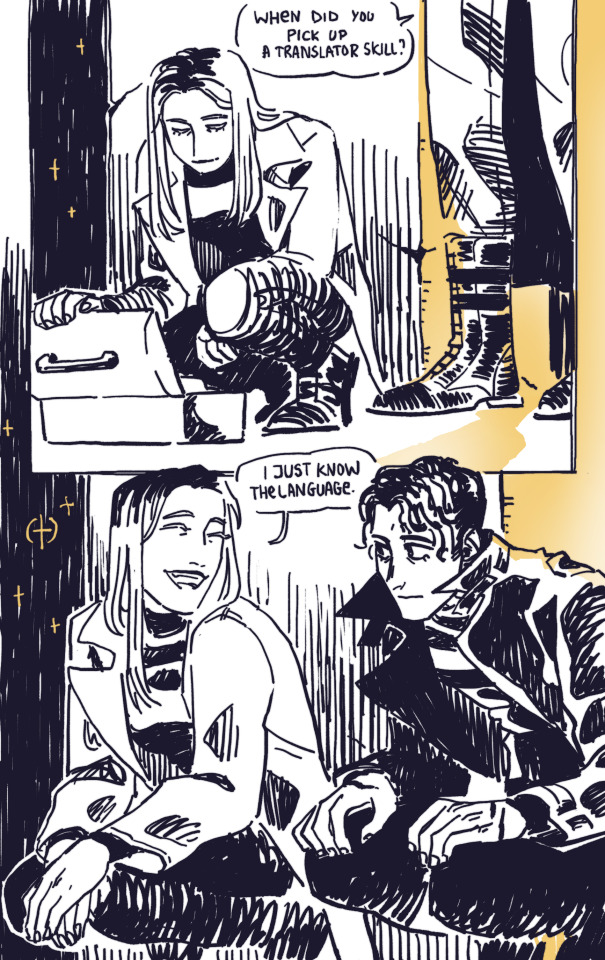

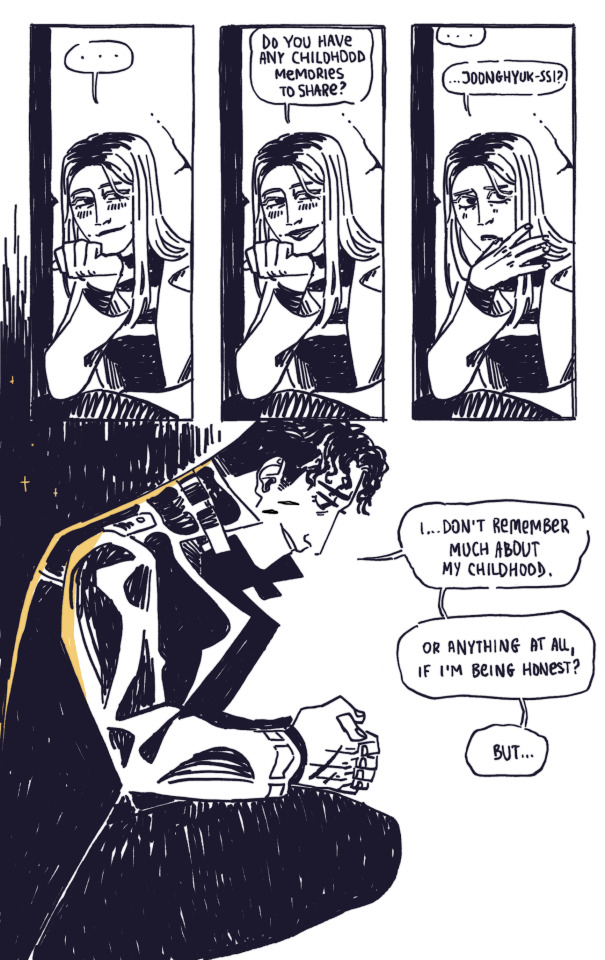

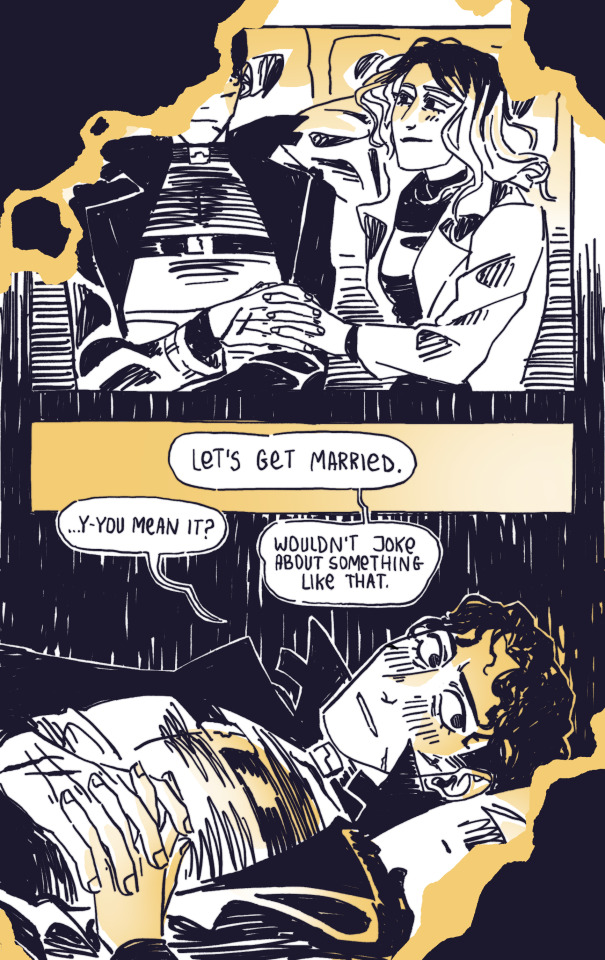
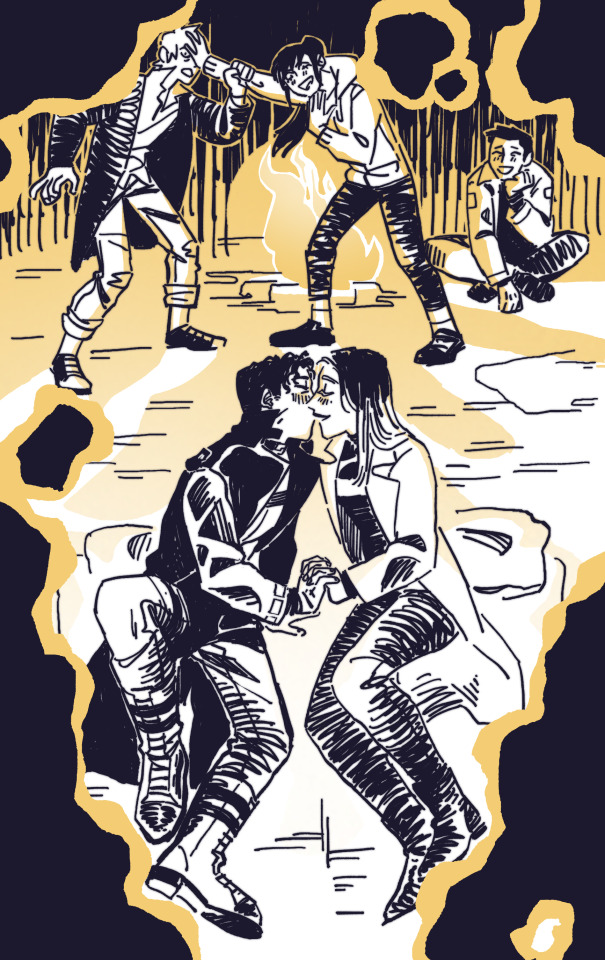

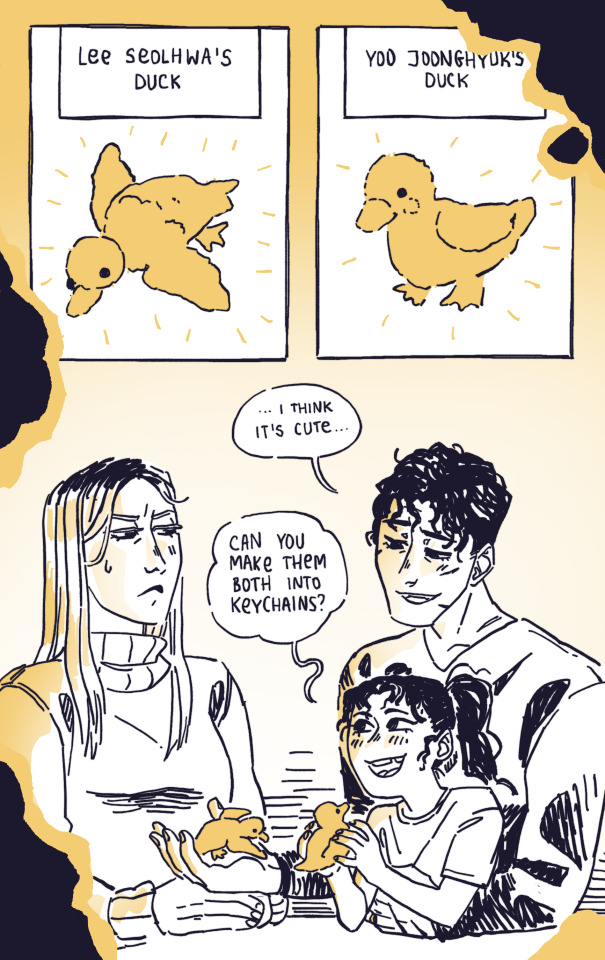
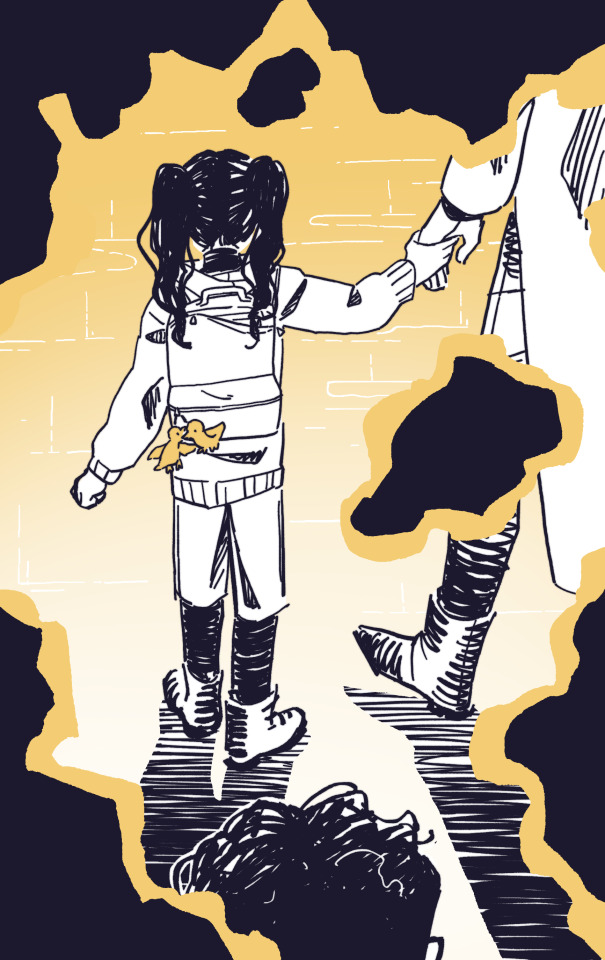

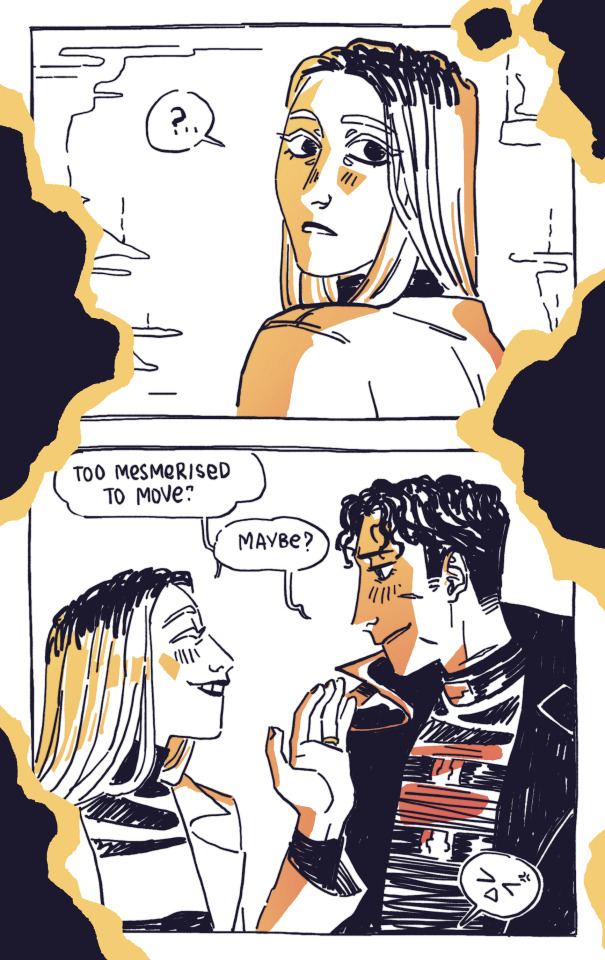




I never meant to feel so dark and cold
@leejihye is back to sponsoring my alive time by commissioning me!!
the outline that makes the heart ache is by @leeseolhwa and the headcanons are from @directorofthefalselastact ! team effort indeed :3
#omniscient reader's viewpoint#orv#my art#orv spoilers#yoo joonghyuk#yoo mia#lee seolhwa#seolhyuk#kim dokja#lee jihye present as ghost of christmas past AND present#id in alt#words do not feel like words anymore
3K notes
·
View notes
Text
in defense of kabumisu……..
addressing things I see people say about why kabru being shipped w mithrun is ‘bad’ or why their canon relationship ‘doesn’t mean anything’ while also clearing up misconceptions of the characters some fans have
listen it keeps popping up and I just gotta do this or my brain will melt (if you don’t see it around then god I wish that were me)
there’s an age gap!- erm there’s also an age gap in farcille (ily), the most popular ship in the series...also chilchuck looks like a kid but a lot of fans recognize him as a dilf because of his relative age, so there should be no age gap discourse among adult characters because it feels so conditional tbh
kabru taking care of mithrun is racist!- marcille likes to take care of others as well. is that sexist, or just an aspect of her character?
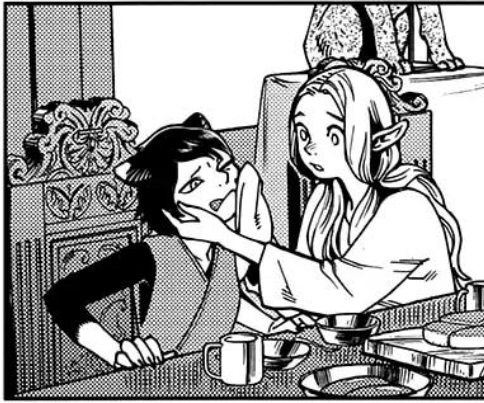

kabru isn’t treated like a servant, waiting on mithrun hand and foot…I mean he gives mithrun a foot massage but no one told him to do all that lmfao
he's also not the only one to care for mithrun. pattadol is shown to worry for him and milsril was the one to start taking care mithrun in the first place after he…...y’know. speaking of which-
they probably met when kabru was a kid!- neither of them showed signs of recognizing each other the entire time mithrun was introduced nor when they were together.
and im pretty sure KABRU of all people would show some kind of recognition if they'd met before. it's kabru!!! the people person!!! mr. "i-noted-down-50+-characters-in-this-dude's-backstory-for-fun-and-actually-enjoy-social-gatherings"
you would think some kind of memory would come back to him especially after hearing mithrun’s backstory if milsril had even told kabru about him as a kid. but nope. it’s just fan speculation unless there's a side comic suggesting otherwise that i haven't seen
mithrun doesn't care about kabru, his shapeshift double looked like shit!- it's obviously because of mithrun's (then) lack of desires that it looked like that, but they really grow on each other
i think it's safe to assume it'd look more like kabru after they spent so much time together (also laios can barely even remember kabru's name..also saw his face multiple times and didn’t recognize him when they talked for the first time)
mithrun is racist!- he’s actually the least likely character to be racist since he lost his desires and that includes a desire for superiority over others. he even calls his past self out on that part of himself. the other elves in that side comic were being just as racist to shorter lived races but just didn’t use ‘outdated slurs’
(unfortunately literally every main character in dunmeshi is at least a lil prejudiced, but I believe it’s worldbuilding and a sign of the times rather than a reason ryoko kui is giving to hate each character)
taking care of others is a pain in the ass!- saying this as a reason kabru and mithrun shouldn't be together is basically saying disabled people shouldn't be allowed to have romantic relationships because they're a "burden"...if someone is actually willing to put in the work, then let them be.
that's not even all of their relationship, mithrun is the fighter of their duo and kabru would've been killed by the shapeshifter or something if he'd fallen down the hole on his own since he sucks at fighting monsters.
mithrun helps collect ingredients for cooking every time, too (barometz fruits and griffin egg). he pulls his weight and then some!! i feel like people forget that part of mithrun a lot somehow.
+senshi literally cooks for everyone all time. it's kind of an important aspect of the narrative.
+also, while it is a popular fan thing I see around that kabru handfeeds mithrun, he literally never does lol this is mithrun using his own hands to eat:
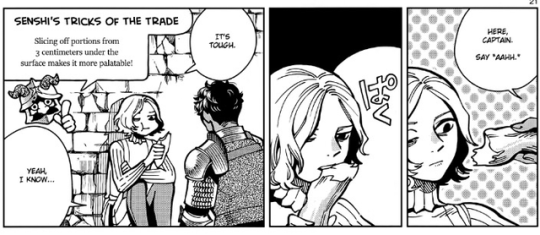
also here we have him washing his own body
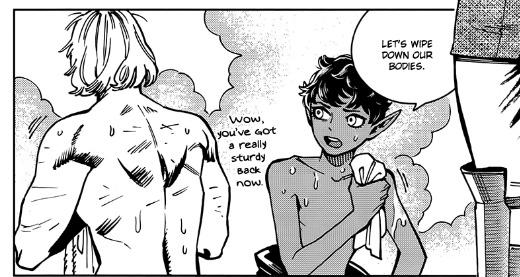
just saying because people like to treat mithrun like a baby even though the narrative respects him as a capable adult who also has special needs because of an accident. he’s captain for a reason
kabru hates taking care of mithrun!- not exactly, he was initially surprised and put off but got used to it quickly. i’m sure he’s grateful for all the times mithrun saved him from a monster and teleported them out of danger as well
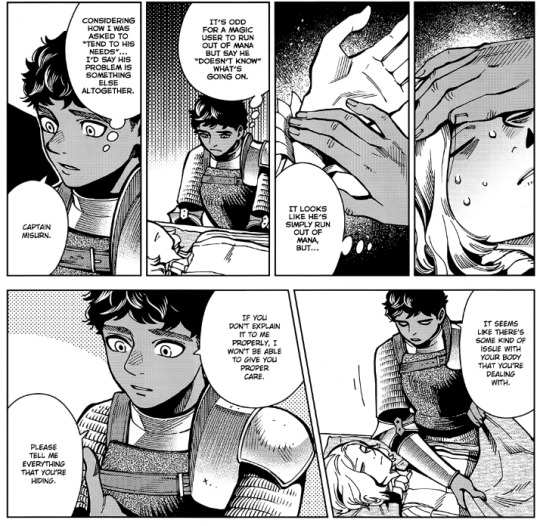
he even starts doing “unnecessary” things for mithrun’s comfort and safety like when mithrun pushes himself too hard fighting, even after his mission to take care of him was complete when the canaries came back
here is even kabru resting while mithrun keeps watch (mithrun let him sleep for 5 hours before waking him up from the nightmare earlier, too):
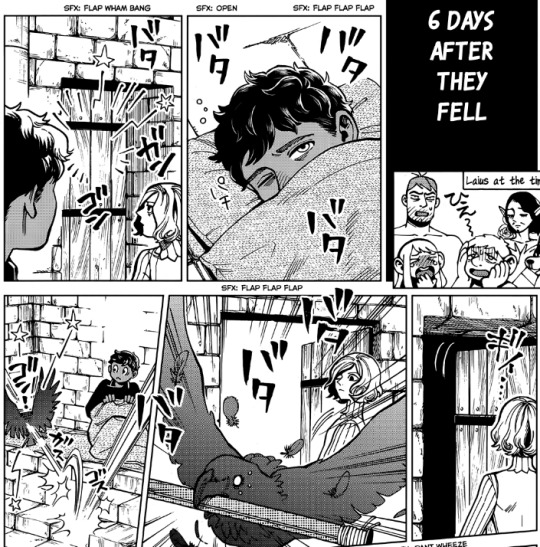
there's nothing more to their relationship!- they actually have had a very tight and consistent dynamic since they met and they incite the most change within each other by the end.
kabru is the one who inspires mithrun to create new desires so he doesn't waste away, and mithrun is the first person we see kabru being genuine with and it leads him to be more honest with others by the end instead of tiptoeing around everyone all the time (that mask was also the reason some ppl initially disliked kabru…)
kabru’s relationship with mithrun is honestly so important for his character and vice versa, but it’s often disregarded because of one over exaggerated aspect of it (an aspect that isn’t even the first way they interact with each other) or because people want to just straight up ignore it for some reason 🥲🥲
kui dedicates many panels to them that don't particularly serve the narrative as a whole in order to demonstrate this and i think that's pretty significant
you're taking this too seriously!- as if i'm the first person in the world to be crazy about a ship or the characters 😭 i love analyzing text and it's upsetting to see them mischaracterized when kui lays out the characters so clearly and deliberately
also they end up touching each other like all the time and have the kind of canon validation most ppl can only dream of lol i feel so insane look at this:
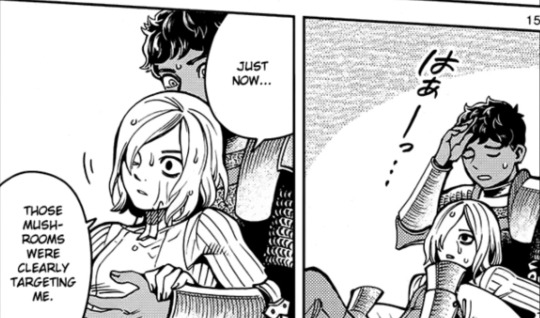
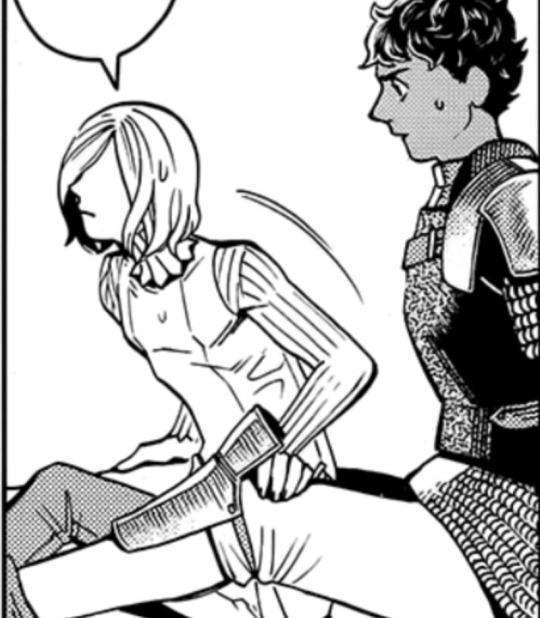
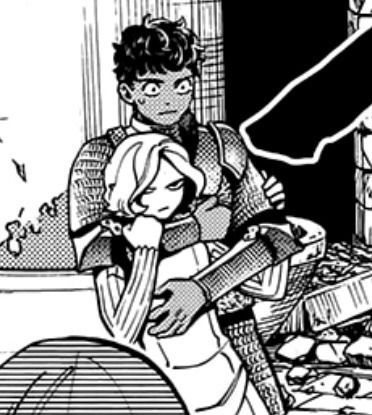
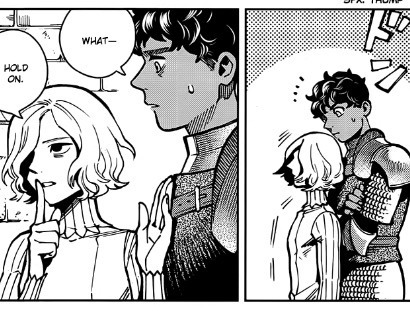
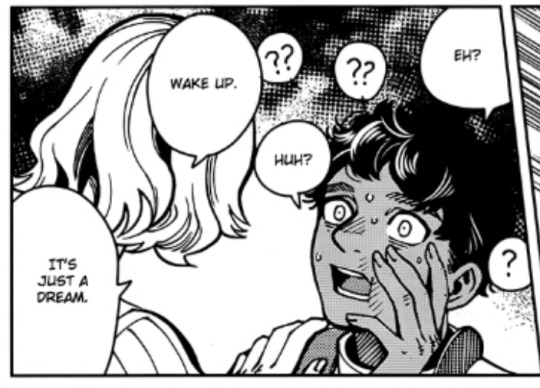
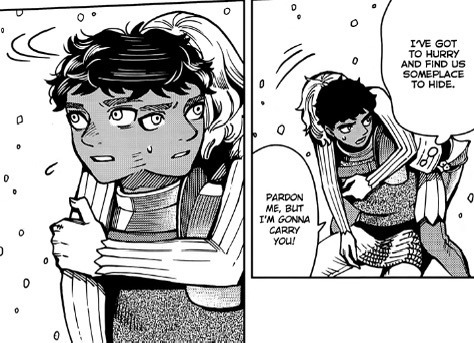
and this is just when they're first getting to know each other cuz there's a fuckload more
kinda hard to explain how i don't actually need them to get married or whatever but i'd die on this hill for them and i enjoy their dynamic immensely
haha you thought you were reading ship discourse but it was actually a character analysis 🤪🤪🤪
also don’t somehow take this to mean I think anyone has to ship them, I just need everyone to understand these accusations kind of don’t make sense especially when they can also apply to other pairs or characters
bonus kabru just looking at mithrun:

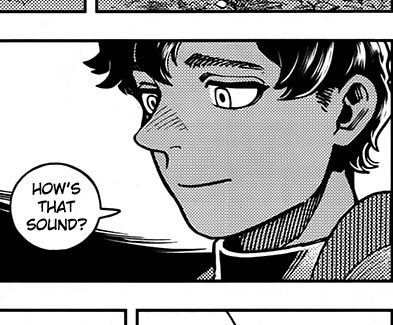
#dungeon meshi#kabumisu#kabru of utaya#mithrun#dungeon meshi spoilers#i'd rather be able to enjoy their dynamic without feeling like i have to explain it but i keep seeing the same takes i cant do this anym-#i feel like i advocate for kabumisu so much because i see so many people mischaracterizing kabru to make l4bru work like how they want#by saying he’s obsessed w laios because he thinks he’s hot..but he was curious about his autistic behavior and eventually thought his lack#of malice would make laios the best candidate for becoming dungeon lord to prevent another utaya tragedy. tho eventually he doubts that#not that i care that he's shipped with laius. i just want ppl to see kabru for who he IS bc some still think hes nothing but a shady bicth#i think that's best shown through his dynamic with mithrun (other than his own words of course) so i want ppl to acknowledge it properly#like idk if I can trust popular fan interpretations of the characters or relationships anymore after the shit with toshiro bro 💀💀#not trying to attach kabru’s entire being to mithrun or anything either just..saying#hm i feel like the way i worded all of this will make some ppl mad. not my intention but whoops#anyways has anyone drawn ship art of senshi and mithrun yet? anyone?
296 notes
·
View notes
Text
[A sad violin song plays over an image of a sad hamster]
Pac: This doesn't have anything to do with me – I wear a blue sweatshirt, you're crazy, this mouse doesn't even have a sweatshirt, this hamster! [Reading chat] Am I a depressed hamster?

[ Transcript continued ↓ ]*
–
Pac: Actually– that's fine! I embrace that idea – of course I'm going to be depressed, are you crazy? [He hits his desk, then starts counting off people on his fingers] Fit is gone, Richarlyson is gone, Ramon is gone, Bagi and Empanada who were always there when we were there are also gone, I haven't seen them! It's just me and Tubbo, and sometimes Philza shows up.
Pac: I lost Chume Labs, I lost the Favela, I lost Murder Mystery, I lost Ilha Chume Labs, it's crazy! Look at how much I've lost, and I've gained nothing! Of course I'm going to be depressed, are you crazy?! How am I supposed to be happy?!
Pac: [Reading chat] "You have us Pac," that's true, thank you. No, that's true, sorry.
* NOTE: Please note that this is an incomplete transcript, as I was primarily relying on Aypierre's translation mod at the time and if I am not confident of the translation, I do not include it. As always, please feel free to add on translations or message me corrections.
#Pactw#QSMP#Pac#March 18 2024#As much as I love keeping people updated about Pac / the other Portuguese-speaking creators#I think I might not make as many transcribed posts for their clips anymore#I just don't think I'm qualified enough to be transcribing things for a language I don't know#like yeah we have the Qlobal Translator and Aypierre's translators to rely on#And I'm always upfront when I'm not 100% sure about a translation#but I've been thinking about it a lot and it kinda makes me feel a bit icky. Idk.#I might be overthinking this but I just I don't want to spread around translations I'm not super confident about#esp. since I know a lot of people cite my clips in analysis posts or link them to other people as resources#and 90% of the time I'm like ''Hell yeah I love seeing people getting a lot of use out of the archive''#but sometimes I get a bit anxious like ''Did I do a good enough job translating this''#''Am I ruining someone's entire perception of a conversation or character because I left one word out or mistranslated something?''#And like I said that's normally not a HUGE concern since if I'm not certain about a translation I just won't post a clip. but you know#idk it might just be the anxiety talking but I really really don't want to spread bad info#Happy to hear other folks' perspective#I'm really grateful for people like Bell and Pix and others who translate clips and I always try to reblog those#but we don't have a ton of people posting clips & translating things on Tumblr since we're so English-centric#which is part of the reason WHY I like sharing clips of the non-English-speaking CCs#but at the same time I want to do an accurate job representing what they're saying#Maybe I'll just start posting things and give a TLDR context of what they're talking about but not a transcript#that way native-speakers can hop in and add translations if that's something they're comfortable doing#and if not then well. at least I'm not sharing something that isn't super accurate#idk I'm just thinking out loud a bit in the tags#But I'm open to hearing other people's thoughts on the matter#Anyways giant rant aside. q!Pac is NOT doing ok rn
251 notes
·
View notes
Text
Double Indemnity, Veritas Ratio and Aventurine

This was originally a part of my compilation post as a short analysis on the Double Indemnity references, linking to this great thread by Manya on Twitter. However, I've recently watched the movie and found that the parallels run much deeper than just the mission name and the light cone itself, plus as the short synopsis I've read online. Since there isn't really an in-depth attempt at an analysis on the film in relation to the way Aventurine and Ratio present themselves throughout Penacony, I thought I'd take a stab at doing just that. I will also be bringing up things from Manya's thread as well as another thread that has some extra points.
Disclaimer that I... don't do analyses very often. Or write, in general — I'm someone who likes to illustrate their thoughts (in the artistic sense) more than write. There's just something about these two that makes me want to rip into them so badly, so here we are. If there's anything you'd like to add or correct me on, feel free to let me know in the replies or reblogs, or asks. This ended up being a rather extensive deep dive into the movie and its influences on the pairing, so please keep that in mind when pressing Read More.
There are two distinct layers on display in Ratio and Aventurine's relationship throughout Penacony, which are references to the two most important relationships in the movie — where they act like they hate/don’t know each other, and where they trust each other.
SPOILER WARNING for the entire movie, by the way. You can watch the film for free here on archive.org, as well as follow along with the screenplay here. I will also be taking dialogue and such from the screenplay, and cite quotes from the original novel in its own dedicated section. SPOILER WARNING for the Cat Among Pigeons Trailblaze mission, as well.

CONTENT WARNING FOR MENTIONS OF SUICIDE. YOU HAVE BEEN WARNED.
To start, Double Indemnity (1944) is a film noir by Billy Wilder (and co-written by Raymond Chandler) based on the novel of the same name by James M. Cain (1927). There are stark differences between the movie adaptation and the original novel which I will get into later on in this post, albeit in a smaller section, as this analysis is mainly focused on the movie adaptation. I will talk about the basics (summaries for the movie and the game, specifically the Penacony mission in tandem with Ratio and Aventurine) before diving into the character and scene parallels, among other things.

—
[THE NAME]
The term "double indemnity" is a clause in which if there’s a case of accidental death of a statistically rare variety, the insurance company has to pay out multiple of the original amount. This excludes deaths by murder, suicide, gross negligence, and natural causes.

The part of the mission in Cat Among Pigeons where Ratio and Aventurine meet with Sunday is named after the movie. And before we get further into things, let's get this part out of the way: The Chinese name used in the mission is the CN title of the movie, so there's no liberties taken with the localization — this makes it clear that it’s a nod to the movie and not localization doing its own thing like with the mission name for Heaven Is A Place On Earth (EN) / This Side of Paradise (人间天堂) (CN).

—
[SUMMARY OF THE 1944 MOVIE]
Here I summarised the important parts that will eventually be relevant in the analysis related to the game.

Insurance salesman Walter Neff, wounded from a gunshot, enters his office and confesses his crime on a dictaphone to his boss Barton Keyes, the claims manager. Much earlier, he had met Phyllis Dietrichson, the wife of Mr. Dietrichson and former nurse. Neff had initially wanted to meet Mr. Dietrichson because of car insurance. Phyllis claims her husband is mean to her and that his life insurance goes to his daughter Lola. With Neff seduced by Phyllis, they eventually brew up a scheme to murder Mr. Dietrichson in such a way that they activate the "double indemnity" clause, and the plan goes off almost perfectly. Initially, the death is labeled a suicide by the president of the company, Norton.
Keyes finds the whole situation suspicious, and starts to suspect Phyllis may have had an accomplice. The label on the death goes from accidental, to suicide, to then murder. When it’s ruled that the husband had no idea of the accidental policy, the company refuses to pay. Neff befriends Phyllis’ stepdaughter Lola, and after finding out Phyllis may have played a part in the death of her father’s previous wife, Neff begins to fear for Lola and himself, as the life insurance would go all towards her, not Phyllis.
After the plan begins to unravel as a witness is found, it comes out that Lola’s boyfriend Nino Zachette has been visiting Phyllis every night after the murder. Neff goes to confront Phyllis, intending to kill her. Phyllis has her own plans, and ends up shooting him, but is unable to fire any more shots once she realises she did love him. Neff kills her in two shots. Soon after telling Zachette not to go inside the house, Neff drives to his office to record the confession. When Keyes arrives, Neff tells him he will go to Mexico, but he collapses before he could get out of the building.
—
[THE PENACONY MISSION TIMELINE]

I won’t be summarising the entirety of Aventurine and Ratio’s endeavours from the beginning of their relationship to their final conversation in Heaven Is A Place On Earth the same way as I summarised the plot of the movie, so I will instead present a timeline. Bolded parts means they are important and have clear parallels, and texts that are in [brackets] and italics stand for the names of either the light cone, or the mission names.
[Final Victor] Their first meeting. Ratio’s ideals are turned on its head as he finally meets his match.
Several missions happen in-between their first encounter and the Penacony project. They come to grow so close and trusting with each other that they can guess, understand each other’s thoughts, way of thinking and minds even in high stakes missions. Enough to pull off the Prisoner’s Dilemma (Aventurine’s E1) and Stag Hunt Game (Aventurine’s E6) and come out on top.
Aventurine turns towards Ratio for assisting him in the Penacony project. Ratio's involvement in the project is implied to be done without the knowledge of Jade, Topaz, and the IPC in general, as he was only sent to Penacony to represent the Intelligentsia Guild, and the two other Stonehearts never mention Ratio.
Aventurine and Ratio cook up the plan to deceive Sunday before ever setting foot on Penacony. Aventurine does not tell Ratio the entirety of his plan.
Aventurine convinces Topaz and Jade to trust him with their Cornerstones. Aventurine also breaks his own Cornerstone and hides it along with the jade within a bag of gift money.
[The Youth Who Chase Dreams] They enter Penacony in the Reverie Hotel. Aventurine is taken to the side by Sunday and has all his valuables taken, which includes the gift money that contains the broken aventurine stone, the jade, and the case containing the topaz.
Aventurine and Ratio speak in a “private” room about how Aventurine messed up the plan. After faking an argument to the all-seeing eyes of Sunday, Ratio leaves in a huff.
Ratio, wearing his alabaster head, is seen around Golden Hour in the (Dusk) Auction House by March 7th.
[Double Indemnity] Ratio meets up with Sunday and “exposes” Aventurine to him. Sunday buys his “betrayal”, and is now in possession of the topaz and jade. Note that this is in truth Ratio betraying Sunday all along.
Ratio meets up with Aventurine again at the bar. Ratio tells Aventurine Sunday wants to see him again.
They go to Dewlight Pavilion and solve a bunch of puzzles to prove their worth to Sunday.
They meet up with Sunday. Sunday forces Aventurine to tell the truth using his Harmony powers. Ratio cannot watch on. It ends with Aventurine taking the gift money with his Cornerstone.
[Heaven Is A Place On Earth] They are in Golden Hour. Ratio tries to pry Aventurine about his plan, but Aventurine reins him in to stop breaking character. Ratio gives him the Mundanite’s Insight before leaving. This is their final conversation before Aventurine’s grandest death.
Now how exactly does the word “double indemnity” relate to their mission in-game? What is their payout? For the IPC, this would be Penacony itself — Aventurine, as the IPC ambassador, handing in the Jade Cornerstone as well as orchestrating a huge show for everybody to witness his death, means the IPC have a reason to reclaim the former prison frontier. As for Ratio, his payout would be information on Penacony’s Stellaron, although whether or not this was actually something he sought out is debatable. And Aventurine? It’s highly implied that he seeks an audience with Diamond, and breaking the Aventurine Cornerstone is a one way trip to getting into hot water with Diamond. With Aventurine’s self-destructive behaviour, however, it would also make sense to say that death would be his potential payout, had he taken that path in the realm of IX.
Compared to the movie, the timeline happens in reverse and opposite in some aspects. I will get into it later. As for the intended parallels, these are pretty clear and cut:
Veritas Ratio - Walter Neff
Aventurine - Phyllis Dietrichson
Sunday - Mr. Dietrichson

There is one other character who I feel also is represented in Ratio, but I won’t bring them up until later down the line.
For the sake of this analysis, I won’t be exploring Sunday’s parallel to Mr. Dietrichson, as there isn’t much on Dietrichson’s character in the first place in both the movie and the novel. He just kind of exists to be a bastard that is killed off at the halfway point. Plus, the analysis is specifically hyper focused on the other two.
—
[SO, WHAT’S THE PLAN?]
To make things less confusing in the long run whenever I mention the words “scheme” and “plan”, I will be going through the details of Phyllis and Neff’s scheme, and Aventurine and Ratio’s plan respectively. Anything that happens after either pair separate from another isn’t going to be included. Written in a way for the plans to have gone perfectly with no outside problems.

Phyllis and Neff —> Mr. Dietrichson
Goal: Activate the double indemnity clause by killing Mr. Dietrichson and making it look like a freak train accident
Payout: Twice or more of the face value of the life insurance ($100,000)
Main Actor: Walter Neff | Accomplice: Phyllis Dietrichson
During the entire time until the payout, Phyllis and Neff have to make sure to any outsiders that they look like complete strangers instead of lovers in an affair.
Step-by-step:
Neff convinces Mr. Dietrichson to sign the policy with the clause without him suspecting foul play, preferably with a third party to act as an alibi. This is done discreetly, making Mr. Dietrichson not read the policy closely and being told to just sign.
Neff and Phyllis talk to each other about small details through the phone (specified to be never at Phyllis’ own house and never when Neff was in his office) and in the marketplace only, to make their meetings look accidental. They shouldn’t be seen nor tracked together, after all.
Phyllis asks Mr. Dietrichson to take the train. She will be the one driving him to the train station.
On the night of the murder, after making sure his alibi is airtight, Neff sneaks into their residence and hides in their car in the second row seating, behind the front row passenger seat. He wears the same colour of clothes as Mr. Dietrichson.
Phyllis and Mr. Dietrichson get inside the car — Phyllis in the driver’s seat and Mr. Dietrichson in the passenger seat. Phyllis drives. On the way to the train station, she makes a detour into an alley. She honks the horn three times.
After the third honk, Neff breaks Mr. Dietrichson’s neck. The body is then hidden in the second row seating under a rug.
They drive to the train station. Phyllis helps Neff, now posing as Mr. Dietrichson, onto the train. The train leaves the station.
Neff makes it to the observation platform of the parlour car and drops onto the train tracks when nobody else is there.
Phyllis is at the dump beside the tracks. She makes the car blink twice as a signal.
The two drag Mr. Dietrichson’s corpse onto the tracks.
They leave.
When Phyllis eventually gets questioned by the insurance company, she pretends she has no idea what they are talking about and eventually storms off.
Phyllis and Neff continue to lay low until the insurance company pays out.
Profit!
Actual Result: The actual murder plan goes almost smoothly, with a bonus of Mr. Dietrichson having broken a leg. But with him not filing a claim for the broken leg, a witness at the observation platform, and Zachette visiting Phyllis every night after the murder, Keyes works out the murder scheme on his own, but pins the blame on Phyllis and Zachette, not Neff.

Now for Aventurine and Ratio. You can skip this section if you understand how deep their act goes, but to those who need a refresher, here’s a thorough explanation:
Aventurine and Ratio —> Sunday
Goal: Collect the aventurine stone without Sunday knowing, ruin the dream (and create the grandest death)
Payout: Penacony for the IPC, information on the Stellaron for Ratio, a meeting with Diamond / death for Aventurine
Main Actor: Aventurine | Accomplice: Veritas Ratio
From the moment they step onto Penacony, they are under Sunday’s ever present and watchful eyes. “Privacy” is a foreign word to The Family. They have to act like they don’t like each other’s company the entire time and feed Sunday information through indirect means so that the eventual “betrayal” by Ratio seems truthful to Sunday. Despite what it looks like, they are closer than one would ever think, and Ratio would never sell out a person purely for information.
Step-by-step:
After Sunday takes away the bag of gift money and box, Aventurine and Ratio talk in a room in the Reverie Hotel.
Aventurine establishes the Cornerstones’ importance, and how he lost the gift money and the case containing the Cornerstones to Sunday. Ratio turns to leave, saying “some idiot ruined everything”, meaning the Cornerstones were vital to their plan. (Note that Ratio is not wearing his alabaster head while saying it to said “idiot”.)
Aventurine then proceeds to downplay the importance of the Cornerstones, stating they are “nothing more than a few rocks” and “who cares if they are gone”. This lets Sunday know that something suspicious may be going on for him to act like it’s nothing, and the mention of multiple stones, and leaves him to look up what a Cornerstone is to the Ten Stonehearts of the IPC.
Ratio points out his absurd choice of outfit, mentioning the Attini Peacock and their song.
Ratio implies that without the aventurine stone, he is useless to the IPC. He also establishes that Aventurine is from Sigonia(-IV), and points out the mark on his neck. To Sunday, this means that Aventurine is shackled to the IPC, and how Aventurine may possibly go through extreme lengths to get the stone back, because a death sentence always looms above him.
Aventurine claims Ratio had done his homework on his background, which can be taken that this is their very first time working together. (It isn’t, and it only takes one look to know that Aventurine is an Avgin because of his unique eyes, so this comment does not make sense even in a “sincere” way, a running theme for the interaction.)
Ratio mentions how the true goal is to reclaim Penacony for the IPC, establishing their ulterior motive for attending the banquet.
Ratio asks if Aventurine went to pre-school in Sigonia after saying trust was reliant on cooperation. Aventurine mentions how he didn’t go to school and how he doesn’t have any parents. He even brings up how friends are weapons of the Avgins. This tells Sunday that the Avgins supposedly are good at manipulation and potentially sees Ratio possibly betraying Aventurine due to his carelessness with his “friends”. Sunday would also then research about the Avgins in general (and research about Sigonia-IV comes straight from the Intelligentsia Guild.)
Ratio goes to Dewlight Pavilion in Sunday’s Mansion and exposes a part of Aventurine’s “plan”. When being handed the suitcase, Ratio opens it up due to his apparent high status in the IPC. He tells Sunday that the Cornerstone in the suitcase is a topaz, not an aventurine, and that the real aventurine stone is in the bag of gift money. This is a double betrayal — on Aventurine (who knows) and Sunday (who doesn’t). Note that while Ratio is not officially an IPC member in name — the Intelligentsia Guild (which is run by the IPC head of the Technology Department Yabuli) frequently collaborates with the IPC. Either Aventurine had given him access to the box, or Ratio’s status in general is ambiguous enough for Sunday not to question him further. He then explains parts of Aventurine’s gamble to Sunday in order to sell the betrayal. Note that Ratio does not ever mention Aventurine’s race to Sunday.
Ratio brings Aventurine to Sunday. Aventurine offers help in the investigation of Robin's death, requesting the gift money and the box in return.
Sunday objects to the trade offer. Aventurine then asks for just the bag. A classic car insurance sales tactic. Sunday then interrogates Aventurine, and uses everything Ratio and Aventurine brought up in the Reverie Hotel conversation and their interactions in the Mansion, as well as aspects that Ratio had brought up to Sunday himself.
Aventurine feigns defeat and ignorance enough so that Sunday willingly lets him go with the gift bag. After all is said and done, Aventurine leaves with the gift money, where the Aventurine Cornerstone is stored all along.
Ratio and Aventurine continue to pretend they dislike each other until they go their separate ways for their respective goals and plans. Aventurine would go on to orchestrate his own demise at the hands of Acheron, and Ratio… lurks in the shadows like the owl he is.
Profit!
Actual Result: The plan goes perfectly, even with minor hiccups like Ratio coming close to breaking character several times and Aventurine being sentenced to execution by Sunday.
This is how Sunday uses the information he gathered against Aventurine:
• Sunday going on a tirade about the way Aventurine dresses and how he’s not one to take risks — Ratio’s comment about Aventurine’s outfit being peacock-esque and how he’s “short of a feather or two”.
• “Do you own a Cornerstone?” — Ratio talked about the aventurine stone.
• “Did you hand over the Cornerstone to The Family when you entered Penacony?” — Aventurine mentioned the box containing the Cornerstones.
• “Does the Cornerstone you handed over to The Family belong to you?” — Aventurine specifically pluralized the word Cornerstone and “a bunch of rocks” when talking to Ratio.
• “Is your Cornerstone in this room right now?” — The box in the room supposedly contained Aventurine’s own cornerstone, when Aventurine mentioned multiple stones.
• “Are you an Avgin from Sigonia?” ��Aventurine mentioned that he’s an Avgin, and Ratio brought up Sigonia.
• “Do the Avgins have any ability to read, control, and manipulate one’s own or another’s minds?” — Aventurine’s comment on how friends are weapons, as well as Sunday’s own research on the Avgins, leading him to find out about the negative stereotypes associated with them.
• “Do you love your family more than yourself?” — His lost parents.
“All the Avgins were killed in a massacre. Am I right?” — Based on Sunday’s research into his background.
• “Are you your clan’s sole survivor?” — Same as the last point.
“Do you hate and wish to destroy this world with your own hands?” — Ratio mentioned the IPC’s goal to regain Penacony, and Aventurine’s whole shtick is “all or nothing”.
• “Can you swear that at this very moment, the aventurine stone is safe and sound in this box?” — Repeat.
As seen here, both duos have convoluted plans that involve the deception of one or more parties while also pretending that the relationship between each other isn’t as close as in reality. Unless you knew both of them personally and their histories, there was no way you could tell that they have something else going on.
On to the next point: Comparing Aventurine and Ratio with Phyllis and Neff.
—
[NEFF & PHYLLIS — RATIO & AVENTURINE]

With the short summaries of the movie and the mission out of the way, let’s look at Phyllis and Neff as characters and how Aventurine and Ratio are similar or opposite to them.

Starting off with Aventurine and Phyllis. Here is where they are the most similar:
Phyllis is blonde and described as a provocative woman. Aventurine is also a blond and eyes Ratio provocatively in the Final Victor light cone.
Phyllis was put under surveillance after Keyes starts figuring out that the so-called accidental death/suicide may have been a murder after all. Similarly, Aventurine was watched by Sunday the entire time in Penacony.
Phyllis never tells Neff how she's seeing another man on the side to possibly kill him too (as well as how she was responsible for the death of her husband‘s previous wife). Aventurine also didn't tell Ratio the entirety of his plan of his own death.
Phyllis puts on a somewhat helpless act at first but is incredibly capable of making things go her way, having everything seemingly wrapped around her finger. Aventurine — even when putting on a facade that masks his true motives — always comes out at the top.
Now the differences between Aventurine and Phyllis:
Phyllis does not care about her family and has no issue with killing her husband, his previous wife, and possibly her daughter Lola. Opposite of that, Aventurine is a family man… with no family left, as well as feeling an insane level of survivor’s guilt.
Really, Phyllis just… does not care at all about anyone but herself and the money. Aventurine, while he uses every trick in the book to get out on top, does care about the way Jade and Topaz had entrusted him with their Cornerstones, in spite of the stones being worth their lives.
Phyllis also uses other people to her advantage to get what she wants, often behind other people's backs, with the way she treats Neff and Zachette. Aventurine does as well (what with him making deals with the Trailblazer while also making a deal with Black Swan that involves the Trailblazer). The difference here is Phyllis uses her allure deliberately to seduce men while Aventurine simply uses others as pawns while also allowing others to do the same to himself.
Phyllis makes no attempt at compromising the policy when questioned by Norton. Aventurine ends up compromising by only taking the gift money (which is exactly what he needs).
The wig that Barbara Stanwyck (the actress of Phyllis) wore was chosen to make her look as “sleazy” as possible, make her look insincere and a fraud, a manipulator. A sort of cheapness. Aventurine’s flashy peacock-esque outfit can be sort of seen as something similar, except the outfit isn’t cheap.

Moving on to Ratio’s similarities to Neff… There isn’t much to extrapolate here as Ratio is more of a side character in the grand scheme of Penacony, however this is what I’ve figured out.
Neff has dark hair. Ratio has dark purple hair.
Neff almost never refers to Phyllis by her name when speaking with her, only as “baby”. The few times he refers to her as Phyllis or Mrs. Dietrichson is during their first conversations and when he has to act like he doesn’t know her. Ratio never calls Aventurine by his name when he’s around him — only as “gambler”, sometimes “damned” or “dear” (EN-only) gambler. Only in the Aventurine's Keeping Up With Star Rail episode does Ratio repeatedly say his name, and yet he still calls him by monikers like “gambler” or, bafflingly, a “system of chaos devoid of logic”.
Both Neff and Ratio committed two betrayals: Neff on Mr. Dietrichson and Keyes, and Ratio on Sunday and Aventurine. With the former cases it was to reach the end of the trolley line, and with the latter it was on a man who had put his trust in him.
As for the differences…
Neff is described as someone who’s not smart by his peers. Ratio is someone who is repeatedly idolised and put on a pedestal by other people.
Neff is excellent at pretending to not know nor care for Phyllis whenever he speaks about her with Keyes or when he and she are in a place that could land them in hot water (the office, the mansion when there are witnesses). His acting is on the same level as Phyllis. With Ratio it’s… complicated. While he does pull off the hater act well, he straight up isn’t great at pretending not to care about Aventurine’s wellbeing.
Instead of getting his gunshot wound treated in the hospital like a normal person, Neff makes the absolutely brilliant decision of driving to his office and talking to a dictaphone for hours. Needless to say, this is something a medical doctor like Ratio would never do.

Now here's the thing. Though it's very easy to just look at Phyllis and Neff in the movie and go "okay, Aventurine is Phyllis and Ratio is Neff — end of story" and leave it at that, I find that they both take from the two leads in different ways. Let me explain. Beginning with Aventurine and Neff…
Neff is the one who hatches the plan and encourages Phyllis to go through and claim the double indemnity clause in the first place. He is also the key player of his own risky plan, having to fake being the husband to enter the train as well as fake the death. Aventurine puts himself at great risk just by being in Sunday’s presence, and hoping that Sunday wouldn’t figure out that the green stone he had uncovered wasn’t the aventurine stone.
Adding onto the last point, Neff had fantasised about pulling off the perfect murder for a long time — the catalyst was simply him meeting Phyllis. Aventurine presumably sought out Ratio alone for his plan against Sunday.
Neff makes a roulette wheel analogy and talks about a pile of blue and yellow poker chips (the latter in the script only). I don‘t even have to explain why this is relevant here. (Aventurine’s Ultimate features a roulette wheel and the motif is on his belt, thigh strap, and back, too. And of course, Aventurine is all about his chips.)
Neff has certain ways to hide when he’s nervous, which include hiding his hands in his pockets when they were shaking, putting on glasses so people couldn’t see his eyes. Aventurine hides his left hand behind his back when he’s nervous: Future Aventurine says that "they don't know the other hand is below the table, clutching [his] chips for dear life", and in multiple occasions such as the Final Victor LC, his character trailer, and even in his boss form in the overworld you can see that Aventurine hides his left hand behind his back. And he is also seen with his glasses on sometimes.
Neff says a bunch of stuff to make sure that Phyllis acts her part and does not act out of character (i.e. during their interactions at the market), like how Aventurine repeatedly tries to get Ratio back on track from his subpar acting.
Neff is always one step ahead of the game, and the only reason the plan blows up in his face is due to outside forces that he could not have foreseen (a witness, Keyes figuring out the plan, the broken leg). Aventurine meanwhile plays 5D chess and even with the odds against him, he uses everything he can to come out on the top (i. e. getting Acheron to kill him in the dream).
Even after coming home on the night of the murder, Neff still felt that everything could have gone wrong. Aventurine, with his blessed luck, occasionally wavers and fears everything could go wrong whenever he takes a gamble.
Neff was not put under surveillance by Keyes due to him being extensive with his alibi. After witnessing Robin’s death with eyewitnesses at the scene, the Family had accepted Aventurine’s alibi, though he would be under watch from the Bloodhounds according to Ratio.
Neff talks about the entire murder scheme to the dictaphone. Aventurine during Cat Among Pigeons also retells his plan, albeit in a more convoluted manner, what with his future self and all.

Continuing with Ratio and Phyllis, even with their personalities and motivations being quite different, they do have a few commonalities.
Phyllis was a nurse. Ratio is a medical doctor.
Her name is Greek of origin. Veritas Ratio, though his name is Latin, has Greco-Roman influences throughout his entire character.
The very first scene Phyllis appears in has her wearing a bath towel around her torso. Ratio loves to take baths to clear his mind.
Phyllis was instructed by Neff to be at the market every morning at eleven buying things. Ratio is seen in an auction house with his alabaster head on so no one could recognize him.
Phyllis mostly acts as an accomplice to the scheme, being the one to convince her husband to take the train instead. She is also generally seen only when Neff is involved. Ratio plays the same role as well, only really appearing in the story in relation to Aventurine as well as being the accomplice in Aventurine’s own death. Even him standing in the auction house randomly can be explained by the theory that he and Aventurine had attempted to destabilise Penacony’s economy through a pump and dump scheme.
With these pointers out of the way, let’s take a closer look at select scenes from the film and their relation to the mission and the pair.
—
[THE PHONE CALL — THE REVERIE HOTEL]

Before the murder, there is a scene with a phone call between Phyllis and Neff discussing the plan while Keyes is in the same room as Neff. Neff has to make sure that Keyes doesn’t think of anything of the phone call, so he acts like he’s calling a “Margie”, and says a bunch of stuff that sounds innocent out of context (“Can’t I call you back, ‘Margie’?” “What color did you pick out?” “Navy blue. I like that fine”), but are actually hinting at the real plan all along (the suit that Mr. Dietrichson wears.)
In a roundabout way, the conversation between Ratio and Aventurine in the Reverie Hotel can be seen as the opposite of that scene — with the two talking about their supposed plan out loud on Penacony ground, a place where the Family (and in turn, Sunday) has eyes everywhere. Despite being in a “private” room, they still act like they hate each other while airing out details that really do not make sense to air out if they really did meet the first time in Penacony (which they didn’t — they’ve been on several missions beforehand). It’s almost like they want a secret third person to know what they were doing, instead of trying to be hushed up about it. The TVs in the room that Sunday can look through based on Inherently Unjust Destiny — A Moment Among The Stars, the Bloodhound statue that disappears upon being inspected, the owl clock on the left which side eyes Ratio and Aventurine, all point to that Sunday is watching their every move, listening to every word.
Rewinding back to before the phone call, in one of the encounters at the marketplace where they “accidentally” run into each other, Phyllis talks about how the trip was off. How her husband wouldn’t get on the train, which was vital for their plan, because of a broken leg. All this, while pretending to be strangers by the passersby. You could say that the part where Ratio almost leaves because Aventurine had “ruined the plan” is the opposite of this, as the husband breaking his leg was something they couldn’t account for, while Aventurine “being short of a few feathers” was entirely part of the plan.
—
[QUESTIONING PHYLLIS — THE INTERROGATION]

This section is going to be a little longer as I will cover two scenes in the movie in a more detailed manner — Mr. Dietrichson signing the policy, and Phyllis being questioned — and how they are represented in the Sunday-Aventurine interrogation and the prior conversation between Ratio and Sunday in multitudes of ways.
Going about their plan, Neff has to make sure that Mr. Dietrichson signs the policy with the double indemnity clause without him knowing the details, all the while having Phyllis (and Lola) in the same room. He and Phyllis have to pretend that they don’t know each other, and that this is just the standard accidental insurance process, instead of signing what would be his downfall. To sell it, he gets Mr. Dietrichson to sign two “copies” of the form, except with Mr. Dietrichson’s second signature, he’s duped into signing the accident insurance policy with the respective clause.
You can tie this to how Ratio goes to Sunday in order to “expose” the lie that the suitcase didn’t actually contain the Aventurine Cornerstone, as well as there being more than one Cornerstone involved in the scheme. Ratio must make sure that Sunday truly believes that he dislikes Aventurine’s company, while also making sure that Sunday doesn’t figure out the actual aventurine stone is broken and hidden in the gift bag. The scheme turns out to be successful, as Sunday retrieves the two Cornerstones, but not the aventurine stone, and truly does think that the green stone he has in his possession is the aventurine.

This whole scene with Sunday is also reminiscent of the interrogation scene in the middle of the movie, where Phyllis was questioned by the boss (Norton) who was deducing that Mr. Dietrichson's death was a suicide, not accidental death. Neff, Phyllis, Keyes and Norton were all in the same room, and Neff and Phyllis had to act like they never knew the other. Phyllis acts like she knows nothing about what Norton insinuates about her husband and eventually, Phyllis explodes in anger and storms out the room, even slamming the door. Her act is very believable to any outsider.

Now back to the Ratio and Sunday conversation. One glaring difference between the movie and here is that his acting isn’t great compared to either Phyllis nor Neff. It never was throughout the Penacony mission. He even comes very close to breaking character several times, and is even defending Aventurine in a somewhat aggressive manner during his one-on-one conversation with Sunday, as in he literally tells Sunday to see a shrink. It’s very different from the way he was acting in Herta Space Station — like Ratio cares about Aventurine too much to keep his hands off.
It's also worth pointing out that Neff doesn't speak a word when Phyllis was being interrogated. Similarly, Ratio is silent throughout the entire scene with Sunday and Aventurine, with his only “line” being a “hm”. When Aventurine calls him a wretch to his face, all he does is look to the side. In fact, he can only look at Aventurine when the other isn’t staring back. Almost like him uttering a single word would give them away. Or his acting is terrible when it has to do with Aventurine, as he has no issue doing the same thing in Crown of the Mundane and Divine (Mundane Troubles).
So, Sunday finds out about the Cornerstones and reveals them to Aventurine, and reasons that he cannot give them back to him because Aventurine had lied. Note that in that same scene, Aventurine attempted to use the two murders that had occurred beforehand against Sunday to retrieve his own cornerstone. Similarly, when it was revealed that Mr. Dietrichson did not know about the accident policy and that the so-called “accidental death” was not, in fact, accidental, the insurance company refused to pay out the money.
Unlike the movie, this was all planned, however. The double-crossing by Ratio, the gift money being the only thing required for Aventurine’s real plan. All of it was an act of betrayal against Sunday, in the same manner as the meticulous planning as Mr. Dietrichson’s murder — To sign the policy, get him to take the train, kill him on the way, and to have Neff pose as the husband on the train until the time is right to get off and lay the body on the tracks. A key difference is that they could not have expected their scheme to be busted wide open due to forces outside of their control, while Ratio and Aventurine went straight down the line for the both of them no matter what.
From here on out, we can conclude that the way Ratio and Aventurine present themselves in Penacony to onlookers is in line with Neff and Phyllis.
—
[“GOODBYE, BABY” — FINAL VICTOR]

And now for the (in)famous light cone, Final Victor. The thing that truly kickstarted the Ratio and Aventurine ship in the fanbase, and the partnership between the two in general. It’s a direct reference to the final confrontation between Neff and Phyllis in the movie.
I’ll fire through all the similarities between the two scenes.
During the respective scenes, Aventurine and Phyllis both outsmart their partner one way or the other: Aventurine with his one-sided game of Russian Roulette, and Phyllis hiding her gun underneath the cushions until Neff turned away.
The guns are owned by Phyllis and Aventurine, not Neff and Ratio.
Phyllis couldn’t bring herself to fire any more shots after she realised she truly did love Neff. Ratio could do nothing but watch as Aventurine did what he did — he couldn’t even pull away if the LC animation is anything to go by him struggling as Aventurine firmly keeps the gun to his chest.
Neff says he doesn’t buy (believe) that Phyllis loved him. She then goes “I’m not asking you to buy […]”. The LC description has Aventurine ask Ratio “You don’t believe me?”, while in the LC animation Ratio straight up says “You expect me to believe you?” and Aventurine answering “Why not, doctor/professor?”
The visual composition of the LC and the scene are nearly identical, from the lighting to the posing to the way Aventurine looks at Ratio — Aventurine and Ratio are even wearing different outfits to fit the scene better. The background in the LC is also like the blinders in the movie, just horizontal.
In the shot where Phyllis’ face is more visible, the way she looks at Neff is strikingly like the way provocatively looks at Ratio. Even their eyes have a visible shine — Phyllis’ eyes brightly shining the moment she realised she really fell in love with Neff, and Aventurine having just a little light return to his eyes in that specific moment.
And now the differences!
Neff holds the gun in his right hand. Aventurine makes Ratio hold his gun in his left.
Neff is the one who takes the gun from Phyllis‘ hand. Aventurine is the one who places the gun in Ratio’s hand and fires it.
Three gunshots are fired. In the movie, Phyllis shoots the first shot and Neff the second and third. Aventurine unloads the gun and leaves only one bullet for this game of Russian Roulette. He pulls the trigger three times, but they all turn out to be blanks.
Phyllis does not break her façade of not smiling until the very last moment where she gets shot. Aventurine is smiling the entire time according to the light cone description, whilst in the animation, it’s only when he guides the gun to his chest that he puts it on.
So, you know how Neff meets Phyllis and it all goes off the rails from there. The way Neff goes from a decent guy to willingly involve himself in a murder scheme, having his morals corrupted by Phyllis. His world having been turned upside down the moment he lays eyes on Phyllis in that first meeting. Doesn’t that sound like something that happened with the Final Victor LC? Ratio, a man all about logic and rationality — a scholar with eight PhDs to his name — all of that is flipped on its head the moment Aventurine pulls out his gun in their first meeting and forces Ratio to play a game of Russian roulette with him. Aventurine casually gambles using his own life like it’s nothing and seemingly without fear (barring his hidden left hand). All or nothing — and yet Aventurine comes out alive after three blanks. Poetic, considering there’s a consumable in the game called “All or Nothing” which features a broken chess piece and a poker chip bound together by a tie. The poker chip obviously represents the gambler, but the chess piece specifically stands for Ratio because he plays chess in his character trailer, his Keeping Up With Star Rail episode and his introduction is centred around him playing chess with himself. Plus, the design of the chess piece has golden accents, similar to his own chess set. In the end, Aventurine will always be the final victor.
Furthermore, Neff had deduced that Phyllis wanted to kill her husband and initially wanted no part in it, but in a subsequent visit it was his own idea that they trigger the double indemnity clause for more money. As the movie progresses though, he starts to have his doubts (thanks in part to him befriending Lola) and makes the move to kill Phyllis when everything starts to come to light. It’s strikingly similar to how Ratio initially wanted no part in whatever Aventurine had in mind when they first met, but in the subsequent missions where they were paired up, he willingly goes along with Aventurine's risky plans, and they come to trust each other. Enough so that Aventurine and Ratio can go to Penacony all on their own and put on an act, knowing that nobody in the IPC other than them can enter the Dreamscape. The mutual respect grew over time, instead of burning passionately before quickly fizzling out like in the movie.
Basically, in one scene, three shots (blanks) start a relationship, and in the other, it ends a relationship. In the anan magazine interview with Aventurine, he says himself that “form[ing] an alliance with just one bullet” with Ratio was one of his personal achievements. The moment itself was so impactful for both parties that it was immortalised and turned into a light cone.
—
[THE ENDING — GOLDEN HOUR]

The ending of Double Indemnity that made it into the final cut has Neff continue his confession on the dictaphone until he realised that he wasn’t alone in the room. Keyes had come inside at some point, but none had said a thing, only listening to a dead man speak of his crime. When Neff sees Keyes, they talk for a moment, Neff says he plans on fleeing to Mexico. Keyes does not think he will make it. He tries to leave, only to collapse at the front of the elevator, Keyes following just behind him. Neff attempts to light a cigar but is too weak to do so, so Keyes does it for him.
Parts of the ending can still be attributed to the interrogation scene between Sunday and Aventurine, so I’ll make this quick before moving on to the conversation in Heaven Is A Place On Earth, Ratio and Aventurine’s final conversation together. Once Sunday mentions how quickly Aventurine gave up the suitcase, he inflicts the Harmony’s consecration on him, which forces Aventurine to confess everything that Sunday asks of. In a way, it’s the opposite of what happens in the movie — where Neff willingly tells the truth about the murder to his coworker. Aventurine does not like Sunday, and Neff is close to Keyes. Ratio also does not speak, similarly to how Keyes didn’t speak and stood silently off to the side.
Post-interrogation in Golden Hour, Ratio worriedly prods at Aventurine and asks him about his plan. He then gives him the Mundanite’s Insight with the Doctor’s Advice inside when Aventurine tells him to leave. Throughout Heaven Is A Place On Earth, Aventurine gets weaker and his head starts to buzz, until he falls to the ground before he can hand in the final gems. Similarly, Neff progressively grows weaker as he records his confession. Keyes says he’s going to call a doctor and Neff says he’s planning to go to Mexico. And when Neff collapses near the elevator, they talk one final time and Keyes lights Neff’s cigar as the other was too weak to do so himself.

—
[OPPOSITE TIMELINES AND DEVELOPMENTS]
Remember how I said the way certain events happen in the movie and the game are mostly opposite and reverse of one another?
The Final Victor LC is the first meeting of Ratio and Aventurine, and Neff killing Phyllis is their final meeting.
Between that first and last meeting between Phyllis and Neff’s whirlwind romance, their relationship becomes strained which ultimately leads to Neff not trusting whatever Phyllis has to say at the end point of the movie. As for Ratio and Aventurine, the exact opposite had happened, to the point where Ratio trusts Aventurine enough to go along with his plans even if they went against his own ideals. The basis of the mission involved Veritas Ratio, whose full name includes the Latin word for “truth”, lying the entire time on Penacony.
Aventurine is sentenced to the gallows by Sunday after his unwilling interrogation. The movie starts and ends with Neff willingly confessing everything to Keyes.
It bears repeating, but I have to make it so clear that the trust between Ratio and Aventurine runs incredibly deep. Being able to predict what your partner says and thinks and plans in a mission as critical as the Penacony project is not something first-time co-workers can pull off flawlessly. All the while having to put on masks that prevent you from speaking sincerely towards one another lest you rat yourselves out. You have no way of contacting outside reinforcements from within Penacony, as the rest of the IPC are barred from entering. To be able to play everybody for fools while said fools believe you yourselves have handed your case on a silver platter requires a lot — trust, knowledge of the other, past experience, and so on. With Phyllis and Neff, the trust they had had been snuffed out when Neff grew closer to Lola and found out what kind of person Phyllis truly was on the inside. Phyllis did not trust nor love Neff enough and was going behind his back to meet with Zachette to possibly take Neff and Lola out. And the whole reason Neff wanted to perpetrate the murder was due to him being initially taken by Phyllis' appearance, which single handedly got the ball rolling on the crime.
Now then, how come trust is one of the defining aspects of Aventurine and Ratio’s relationship, when Phyllis and Neff’s trust eventually lead to both their deaths at the hands of the other? Sure, this can be explained away with the opposite theory, but there’s one other relationship involving Neff which I haven’t brought up in excruciating detail yet. The other side of Ratio and Aventurine’s relationship.
—
[NEFF & KEYES — AVENTURINE & RATIO]

Here is where it gets more interesting — while Phyllis and Neff are at the centre point of the movie, there is another character to whom Neff has a close relationship with — Keyes. It’s also the only relationship with no pretences, at least, until the whole murder thing happened and Neff had to hide his involvement from Keyes. Watching the movie, I couldn't help but feel there was something more to the two than meets the eye. I knew that queer readings of the film existed, but I didn't think too much of them until now. And though Aventurine and Ratio parallel Phyllis and Neff respectively, the fact that they also have traits of their opposite means that it wouldn’t be completely out of the question if parts of their relationship were also influenced by Keyes and Neff on a deeper and personal level. Let me explain.
Keyes and Neff were intimate friends for eleven years and have shown mutual respect and trust towards one another. They understood each other on a level not seen with Phyllis and Neff. Even after hearing Neff confess his crimes through the dictaphone (and eventually standing in the same room while Neff confessed), he still cared for the other man, and stayed with him when Neff collapsed at the front door. The only reason Keyes hadn’t deduced that it was Neff who was behind the murder was because he had his absolute trust in him. Keyes is also Neff’s boss, and they are always seen exchanging playful banter when they are on screen together. Neff even says the words “I love you, too” twice in the movie — first at the beginning and second at the end, as the final line. There’s also the persistent theme of Neff lighting Keyes’ cigarettes (which happens in every scene where they are face-to-face), except in the end where it’s Keyes who lights Neff’s.
Doesn’t that sound familiar? Mutual respect, caring too much about the other person, the immense amount of trust… Ratio says he’s even the manager of the Penacony project (which may or may not be a lie), and despite their banter being laced with them acting as “enemies”, you can tell that in Dewlight Pavilion pre-Sunday confrontation that Aventurine genuinely likes Ratio’s company and believes him to be a reliable person. From the way he acts carefree in his words to the thoughts in his head, as seen in the mission descriptions for Double Indemnity. Their interactions in that specific mission are possibly the closest thing to their normal way of speaking that we get to see on Penacony.

Not to mention, this is the way Neff describes Keyes. He even says (not in the script) “you never fooled me with your song and dance, not for a second.” Apart from the line about the cigar ashes, doesn’t this ring a bell to a certain doctor? “Jerk” with a heart of gold?

After solving the puzzle with the statues, Ratio jokingly offers Aventurine to join the Genius Society. Aventurine then goes "Really? I thought you’ve given up on that already", and then Ratio says it was, in fact, a joke. Solving the puzzle through brute force has Ratio telling Aventurine that the Council of Mundanites (which Ratio himself is a part of) should consider him a member. In the movie, where the scene with the phone call with Neff and Phyllis reiterating details of their plan happens, Keyes actually offered Neff a better job (specifically a desk job, as Keyes’ assistant). The two pairs saw the other as smart, equals, and were invested in each other’s careers one way or another.

Because of all this, the character parallels for this side of the relationship are as follows:
Aventurine - Walter Neff
Veritas Ratio - Barton Keyes
With the way I’ve talked about how Aventurine and Ratio take from both leads in terms, it does fit to say that Aventurine is Neff, and Ratio is Keyes in this layer of their relationship. Since we’re on the topic of Keyes, let me also go through some similarities with him and Ratio specifically.
Keyes says the words “dimwitted amateurs” in his first on-screen conversation with Neff. You can’t have Dr. Ratio without him talking about idiocy in some way.
Keyes almost only appears in the movie in relation to Neff, and barring a single interaction in Neff’s house, is also only seen in the office. Same with Phyllis, Ratio also only ever appears regarding Aventurine.
Keyes genuinely wanted the best for Neff, even offering to celebrate with him when he thought the case truly had been busted wide open by forces when Zachette entered the picture. You could say the same for Ratio, as he hoped that Aventurine wouldn’t dwell on the past according to his response on Aventurine’s Interview, as well as telling him to “stay alive/live on (CN)” and wishing him the best of luck in his Doctor’s Advice note.
Whether or not you believe that there was more going on with Neff and Keyes is up to you, but what matters is that the two were very close. Just like Ratio and Aventurine.
—
[THE ORIGINAL FILM ENDING]
Something that I hadn’t seen brought up is the original ending of Double Indemnity, where Neff is executed in a gas chamber while Keyes watches on, shocked, and afterwards leaves somberly. The ending was taken out because they were worried about the Hays Code, but I felt it was important to bring it up, because in a way, you can kind of see the Sunday interrogation scene as Sunday sending Aventurine to his death in seventeen system hours. And Ratio doesn’t speak at all in that scene, and Keyes doesn’t either according to the script.
Another thing that’s noteworthy is that Wilder himself said “the story was about the two guys” in Conversations with Wilder. The two guys in question are Keyes and Neff.

—
[THE NOVEL]

With the original film ending covered, now it is time to bring up the novel by James M. Cain. I bought the book just to read about the differences between the adaptation and the original source material, and to list a few more similarities and opposites I could gather. For this section alone, due to the changes in the (last) names of certain characters, I will be referring to Walter Huff (Neff in the movie) as Walter, and Mr. Dietrichson as Nirdlinger. The plot is pretty much the same as the movie’s apart from a couple of changes so there isn’t a need to recount everything.
From my two read-throughs of the novel, these are the following passages that stood out to me the most. Starting with Aventurine:
Walter, as a top businessman of the company, knows how to sway a deal and to get what he truly wants with what the other gives him. Aventurine is the same, reliant on his intuition, experience and whatever information he has on the table to claim the win. Him luring out Sparkle in Heaven Is A Place On Earth and his conversation with Acheron in the Nihility is indicative of that.
• "But you sell as many people as I do, you don't go by what they say. You feel it, how the deal is going. And after a while I knew this woman didn't care anything about the Automobile Club. Maybe the husband did, but she didn't. There was something else, and this was nothing but a stall. I figured it would be some kind of a proposition to split the commission, maybe so she could get a ten-spot out of it without the husband knowing. There's plenty of that going on. And I was just wondering what I would say to her."
Phyllis, like in the movie, had been hiding her true intentions of talking to Walter in their first conversations, always saying things that she didn’t actually mean. In a similar vein, Aventurine consistently says stuff but almost never truly means any of it, which is all part of his façade.
• "And I could feel it again, that she wasn't saying what she meant. It was the same as it was the first afternoon I met her, that there was something else, besides what she was telling me. And I couldn't shake it off, that I had to call it on her."
When discussing the murder plan with Phyllis, Walter makes this comment, kind of like how Aventurine seems to operate in a way where he has a plan, but is ready to improvise and think fast when needed.
• "And then it's one of those things where you've got to watch for your chance, and you can't plan it in advance, and know where you're going to come out to the last decimal point."
Remember the roulette wheel line from the movie? In the novel, the gambling metaphor that Walter makes about the insurance business goes on for two paragraphs, mentioning a gambling wheel, stack of chips, a place with a big casino and the little ivory ball, even about a bet on the table. Walter also talks about how he thinks of tricks at night after being in the business for so long, and how he could game the system. Needless to say, insanely reminiscent of Aventurine.
• "You think I’m nuts? All right, maybe I am. But you spend fifteen years in the business I’m in, and maybe a little better than that, it’s the friend of the widow, the orphan, and the needy in time of trouble? It’s not. It’s the biggest gambling wheel in the world. It don’t look like it, but it is, from the way they figure the percentage on the oo to the look on their face when they cash your chips. You bet that your house will burn down, they bet it won’t, that’s all. What fools you is that you didn’t want your house to burn down when you made the bet, and so you forget it’s a bet. To them, a bet is a bet, and a hedge bet don’t look any different than any other bet. But there comes a time, maybe, when you do want your house to burn down, when the money is worth more than the house. And right there is where the trouble starts."
• "Alright, I’m an agent. I’m a croupier in that game. I know all their tricks, I lie awake thinking up tricks, so I’ll be ready for them when they come at me. And then one night I think up a trick, and get to thinking I could crook the wheel myself if I could only put a plant out there to put down my bet."
• "I had seen so many houses burned down, so many cars wrecked, so many corpses with blue holes in their temples, so many awful things that people had pulled to crook the wheel, that that stuff didn’t seem real to me anymore. If you don’t understand that, go to Monte Carlo or some other place where there’s a big casino, sit at a table, and watch the face of the man that spins the little ivory ball. After you’ve watched it a while, ask yourself how much he would care if you went out and plugged yourself in the head. His eyes might drop when he heard the shot, but it wouldn’t be from the worry whether you lived or died. It would be to make sure you didn’t leave a bet on the table, that he would have to cash for your estate. No, he wouldn’t care."
Returning home from the murder, Walter attempted to pray, but was unable to do it. Some time passed and after speaking to Phyllis, he prayed. Aventurine presumably hadn’t done the prayer ever since the day of the massacre, and the first time he does it again, he does it with his child self.
• "I went to the dining room and took a drink. I took another drink. I started mumbling to myself, trying to get so I could talk. I had to have something to mumble. I thought of the Lord's Prayer. I mumbled that, a couple of times. I tried to mumble it another time, and couldn't remember how it went."
• "That night I did something I hadn’t done in years. I prayed."
Phyllis in the book is much more inclined towards death than her movie version, even thinking of herself as a personification of death. She’s killed ten other people (including infants) prior to the events of the novel. Something to keep in mind as Aventurine had mentioned several times that he attempted to kill himself in the dream, plus his leadup to his “grandest death”. Just like Phyllis, he’s even killed at least a few people before, though the circumstances of that were less on his own volition and more so for the sake of his survival (i.e. the death game in the maze involving the 34 other slaves where he was the winner and another time where he murdered his own master). Instead of Phyllis playing the active role of Death towards everybody else, Aventurine himself dances with Death with every gamble, every time his luck comes into play. Danse Macabre.
• "But there’s something in me, I don’t know what. Maybe I’m crazy. But there’s something in me that loves Death. I think of myself as Death, sometimes."
• "Walter, The time has come. For me to meet my bridegroom [Death]. The only one I ever loved."
Moving on to Ratio:
Walter says several times that it’s hard to get along with Keyes, and how he says nice things after getting you all worked up. A hard-headed man to get along with, but damn good at his job. Sound like someone familiar?
• "That would be like Keyes, that even when he wanted to say something nice to you, he had to make you sore first."
• "It makes your head ache to be around him, but he’s the best claim man on the Coast, and he was the one I was afraid of."
Keyes sees Walter as smarter than half the fools in the company. Ratio can only stand the company of Aventurine in regards to the IPC.
• "Walter, I'm not beefing with you. I know you said he ought to be investigated. I've got your memo right here on my desk. That's what I wanted to tell you. If other departments of this company would show half the sense that you show—"
• "Oh, he confessed. He's taking a plea tomorrow morning, and that ends it. But my point is, that if you, just by looking at that man, could have your suspicions, why couldn't they—! Oh well, what's the use? I just wanted you to know it."
After going on a rant about the H.S. Nirdlinger case (Phyllis’ husband) and how Norton is doing a horrible job, he ends it by saying that it’s sheer stupidity. “Supreme idiocy”, anybody?
• "You can’t take many body blows like this and last. Holy smoke. Fifty thousand bucks, and all from dumbness. Just sheer, willful, stupidity!"
Phyllis’ former occupation as a nurse is more elaborated on, including her specialization — pulmonary diseases. One of Ratio’s crowning achievements is curing lithogenesis, the “King of Diseases”.
• "She’s one of the best nurses in the city of Los Angeles. […] She’s a nurse, and she specialized in pulmonary diseases. She would know the time of crisis, almost to a minute, as well as any doctor would."
As for the murder scheme, they talk about it a lot more explicitly in the novel. Specifically, Walter mentions how a single person cannot get away with it and that it requires more people to be involved. How everything is known to the party committing the crime, but not the victim. And most importantly: Audacity.
"Say, this is a beauty, if I do say it myself. I didn't spend all this time in the business for nothing, did I? Listen, he knows all about this policy, and yet he don't know a thing about it. He applies for it, in writing, and yet he don't apply for it. He pays me for it with his own check, and yet he don't pay me. He has an accident happen to him and yet he don't have an accident happen to him. He gets on the train, and yet he don't get on it."
"The first is, help. One person can't get away with it, that is unless they're going to admit it and plead the unwritten law or something. It takes more than one. The second is, the time, the place, the way, all known in advance—to us, but not him. The third is, audacity. That's the one that all amateur murderers forget. They know the first two, sometimes, but that third, only a professional knows. There comes a time in any murder when the only thing that can see you through is audacity, and I can't tell you why."
"And if we want to get away with it, we've got to do it the way they do it, […]"
"Be bold?"
"Be bold. It's the only way."
"I still don't know—what we're going to do."
"You'll know. You'll know in plenty of time."
"We were right up with it, the moment of audacity that has to be be part of any successful murder."
It fits the situation that Aventurine and Ratio find themselves in extremely well: For the first point— Aventurine would not be able to get away with simply airing out details by himself, as that would immediately cast suspicion on him. Having another person accompany him who not only isn’t really a part of the IPC in name (as the IPC and The Family have a strenuous relationship) but would probably be able to get closer to Sunday because of that means they can simply bounce off each other without risking as much suspicion with a one-man army. Which is exactly what Ratio and Aventurine do in the conversations they have on Penacony. Secondly — they knew how Sunday operates: as a control freak, he leaves no stone unturned, which is how he became Head of the Oak Family, so their acting required them to give off the impression that a. they hated each other, b. Ratio would go against Aventurine’s wishes and expose him in return for knowledge, c. there were only the two Cornerstones that were hidden. This would give Sunday the illusion of control, and lead to Sunday to lower his guard long enough for Aventurine to take the gift money in the end. The pair knew this in advance, but not Sunday. And thirdly — the plan hinged on a high-level of risk. From breaking the Aventurine Cornerstone, to hoping that Sunday wouldn’t find it in the gift bag, to not telling Ratio what the true plan is (meaning Ratio had to figure it out on his own later on), to Sunday even buying Ratio’s story, it was practically the only way they could go about it. “Charming audacity”, indeed.
An interesting aspect about the novel is that the ending of the novel is divergent from the movie’s final cut and the original ending: Phyllis and Walter commit suicide during a ferry ride to Mexico. The main reason this was changed for the movie was because of the Hays Code, and they wouldn’t allow a double suicide to be screened without reprecussions for criminals. There’s also a bunch of other aspects that differentiate the novel from the movie (no narration-confession as the confession happens in a hospital, less characterization for Keyes and instead a bigger focus on Lola and her boyfriend, the focus on the murderous aspect of Walter and Phyllis’ relationship instead of actual romance, Walter falling in love with Lola (with an unfortunately large age gap attached), etc.)
As for the ending, this wouldn’t even be the first romance media reference related to Aventurine and Ratio where both the leads die, with the other being The Happy Prince and San Junipero (in relation to the EN-only Heaven Is A Place On Earth reference), which I normally would chalk up as a coincidence, though with the opposite line-of-thought I have going on here (and the fact that it’s three out of four media references where the couple die at the end…), I think it’s reasonable to say that Ratio and Aventurine will get that happy ending. Subverting expectations, hopefully.
—
[THE HAYS CODE — LGBT CENSORSHIP IN CHINA]
I’ve brought up the Hays code twice now in the previous two sections, but I haven’t actually explained what exactly it entails.
The Hays Code (also known as the Motion Picture Production Code) is a set of rules and guidelines imposed on all American films from around 1934 to 1968, intended to make films less scandalous, morally acceptable and more “safe” for the general audiences. Some of the “Don’ts” and “Be Carefuls” include but are not limited to…
(Don’t) Pointed profanity
(Don’t) Inference of sex perversion (which includes homosexuality)
(Don’t) Nudity
(Be Careful) Sympathy for criminals
(Be Careful) Use of firearms
(Be Careful) Man and woman in bed together

What does this have to do with a Chinese gacha game released in 2023? If you know a little bit about miHoYo’s past, you would know that pre-censorship laws being upheld to a much stronger and stricter degree, they had no problem showcasing their gay couples in Guns Girl Z (Honkai Gakuen 2/GGZ) and Honkai Impact 3rd, with the main three being Bronya/Seele, Kiana/Mei (admittedly the latter one is a more recent example, from 2023), and Sakura/Kallen. Ever since the Bronya and Seele kiss, censorship in regards to LGBT content ramped up, causing the kiss to be removed on the CN side, and they had to lay low with the way they present two same-sex characters who are meant to be together. They can’t explicitly say that two female or male characters are romantically involved, but they can lace their dynamics with references for those “in the know” — Subtext. Just enough to imply something more but not too much that they get censored to hell and back.
So what I’m getting at is this: The trouble that Double Indemnity had to go through in order to be made while also keeping the dialogue of Phyllis and Neff as flirtatious as they could under the Hays Code among other things is quite similar to the way Ratio and Aventurine are presented as of now. We never see them interact outside of Penacony (at least up until 2.2, when this post was drafted), so we can only infer those interactions specifically until they actually talk without the fear of being found out by Sunday. But, there’s still some small moments scattered here and there, such as when Aventurine goes near Ratio in the Dewlight Pavilion Sandpit, he exclaims that “the view here is breathtaking” (he can only see Ratio’s chest from that distance) and that Ratio could “easily squash [him] with just a pinch”. Ratio then goes “If that is your wish, I will do so without a moment’s hesitation.” Not to mention the (in)famous “Doctor, you’re huge!” quote.

It’s not a coincidence that Ratio and Aventurine have three explicit references to romance media (Double Indemnity, Spellbound, Oscar Wilde’s The Happy Prince), possibly even four if you take the EN-only Heaven Is A Place On Earth as a reference to Black Mirror’s San Junipero. It’s not a coincidence that the storylines or characters of said references parallel the pairing, from surface-level to deep cuts. It’s not a coincidence that the CN voice actors were asked to “tone it down” by the voice director when it came to their chemistry. It’s not a coincidence that Aventurine has only flirted with (three) men throughout Penacony, even referring to a Bloodhound NPC as a “hunk of a man” inside his thoughts, all the while ignoring Himeko and Robin when it came to their looks — women who are known across the cosmos with a myriad of adoring fans. There are so many other so-called “coincidences” related to the two that you could make an iceberg just based on versions 2.0-2.2 as well as content miHoYo themselves have put out on social media. They absolutely knew what they were doing, and were trying to get their point across through subtle means — the extent they went to with the Double Indemnity reference while also keeping it under wraps from a “surface” level point of view is proof of this — the implications are there if you take the time to look for them, and are simply hard to ignore or deny once you do find them.
—
[CONCLUSION]
This was supposed to be short considering the other analyses I’ve seen were also pretty short in comparison, but I couldn’t get the movie out of my head and ended up getting carried away in the brainrot. I hope you could follow along with my line of thinking, even with the absurd length of this post, and the thirty-image limit. I tried to supplement context with some links to videos and wiki pages among other sources wherever I can to get around it.
I will end it with this though — the love in the movie turned out to be fake and a farce, going off track from what was a passionate romance in the beginning because of the murder scheme. Meanwhile, the whole reason why Ratio and Aventurine can pull off whatever they want is because of their immense trust in one another. What was initially shown to be distrust in the Final Victor LC grew into something more, for Ratio, someone who would have never put faith into mere chance and probability before this, put his trust in Aventurine, of all people.
TL;DR — (I get it, it’s over ten thousand words.)
Not only is the relationship between Neff and Phyllis represented in the deception and acting side of Ratio and Aventurine, but the real and trusting side is shown in Neff and Keyes. They have a fascinating, multi-layered dynamic that is extremely fun to pick apart once you realise what’s going on underneath the bickering and “hatred” they display.
Many thanks to Manya again for making the original thread on the movie. I wouldn’t be here comparing the game and movie myself if it weren’t for that.
By the way, I really do believe that Shaoji totally watched this movie at least once and really wanted that Double Indemnity AU for his OCs. I know exactly how it feels.
—
Other points I'd like to mention that didn't fit anywhere else in the main analysis and/or don’t hold much significance, have nothing to do with the Penacony mission, or may even be considered reaching (...if some of the other points weren’t). Just some potentially interesting side bits.
Phyllis honks three times to signal Neff to go for the kill. That, and the three gunshots in the confrontation. Aventurine is all about the number three.
The height difference Aventurine and Ratio have going on is close to Phyllis and Neff’s.
Phyllis had killed her husband’s previous wife and went on to marry Mr. Dietrichson, pretty much taking the wife’s place. Aventurine killed his previous master, and had taken certain attributes from him like his wristwatch and the rings on his hand and the “all or nothing” mantra.
When calling Ratio a wretch (bastard), Aventurine smiles for a moment. This is exclusive to the EN, KR and JP voiceovers, as in CN, he does not smile at all. (Most definitely a quirk from the AI they use for lip syncing, but the smile is something that’s been pointed out quite a few times so I thought I’d mention it here.)
Sunday specifically says in the CN version that he knew of Aventurine's plans the moment Aventurine left the mansion, meaning that he realized he had been played the fool the moment Ratio and Aventurine talked in Golden Hour
In the description for the "All or Nothing" consumable, teenage Aventurine says this specific line: "Temptation is a virtue for mortals, whereas hesitation proves to be a fatal flaw for gamblers." According to Ratio, this is Aventurine's motto - he says as such in Aventurine's Keeping Up With Star Rail episode. Note that in the anan interview he explicitly says he does not have a motto, and yet Ratio in the video says otherwise. They definitely have to know each other for a while for Ratio to even know this.
A big reason why Neff even pulled off the murder scheme in the first place was because he wanted to see if his good friend Keyes could figure it out, the Mundane Troubles Trailblaze Continuance showcases Ratio attempting to teach the Herta Space Station researches a lesson to not trust the Genius society as much as they did.
In Keyes’ first scene he’s exposing a worker for writing a policy on his truck that he claimed had burnt down on its own, when he was the one who burnt it down. Ratio gets into an Ace Attorney-style argument with the Trailblazer in Mundane Troubles.
Neff talks repeatedly about how it won’t be sloppy. Nothing weak. And how it’ll be perfect to Phyllis, and how she’s going to do it and he’s going to help her. Doing it right — “straight down the line”. Beautifully ironic, considering what happens in the movie, and even more ironic as Ratio and Aventurine’s scheme went exactly the way they wanted to in the end. Straight down the line.
#honkai star rail#double indemnity#veritas ratio#aventurine#golden ratio#ratiorine#an attempt at analysis by one a-u#relationship analysis#you know what‚ i guess i can tag the other names of this ship#aventio#raturine#you could make a fucking tierlist of these names#um‚ dynamics (yk what i mean) dont really matter here in the analysis just fyi if youre wondering its general enough#also if you're wondering about the compilation thread - its not done. it'll take a while (a long while.)#this post was so long it was initially just a tumblr draft that i then put into google docs. and it ended up being over 2k+ words long#is this a research paper‚ thesis‚ or essay? who knows! this just started as just a short analysis after watching the movie on may 5#final word count according to docs (excluding alt text): 13013 - 43 pages with formatting#i wish i could have added more images to this‚ 10k words vs 30 images really is not doing me any favours…#plus‚ i hit the character limit for alt text for one of the images.#if you see me mixing up british and american spelling‚ you probably have!#oh yeah. if any of the links happen to break at some point. do tell. i have everything backed up#there also may be multiple links strung together‚ just so you know.#I link videos using the EN and CN voiceovers. Just keep that in mind if the jump between two languages seems sudden.#I had to copy and paste this thing from the original tumblr draft onto a new post because tumblr wouldn't let me edit the old one anymore.#Feels just like when I was finalising my song comic…#(Note: I had to do this three times.)#I started this at May 5 as a way to pass the time before 2.2. You can probably tell how that turned out.#Did you know there is a limit to the amount of links you can add to a single tumblr post? It's 100. I hit that limit as well.#So if you want context for some of these parts... just ask.#I'm gonna stop here before I hit the tag limit (30) as well LMAOO (never mind I just did.)
121 notes
·
View notes
Text


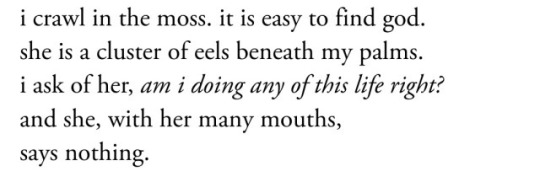






I Have Never Been Forgiven for not Understanding
You Shall Know our Velocity!, Dave Eggers// @heartmush // "Outbreaks", Kitchen McKeown// "Cures for Shame", Rookiemag// The Allure of Shame, John Dalton// "Outbound", Hieu Minh Nguyen// Visual Overdose//
#web weaving#poetry#prose#spilled ink#intertextuality#painting#spilled words#collage#art#words#dave eggers#kitchen McKeown#john dalton#hieu minh nguyen#this left the drafts way too early lol#I wanted to make a web weaving on this topic because I feel like I've spent my whole life afraid of not knowing#everyone just kind of expects you to know what you're supposed to do and that freaks me out#i remember my second job a regular came in and asked for his usual on my second day#i of couse didnt know what his usual was and asked him to clarify#cue him screaming at me about how nobody hires competent people anymore#don't even get me started on all those playground games all the other kids just knew
969 notes
·
View notes
Text
I’ve made a billion fucking drafts and can’t find the words to talk about cellbit and bagi from today. how the fuck do you explain the intricacies between a brother who has lived a life that has sharpened him to cut what he touches, and a sister who had to live with his absence? a man who has to see the childhood he never got to have whenever he looks at the woman he now knows is his twin? said twin who cannot understand why her brother would be anything but glad they are reunited? how do you get across that tangled mess of emotions cellbit had to get him to burn his old pet worm? the paradox of longing for what could have been while desperate to get rid of any reminder, with a healthy dose of paranoia that anything could be a federation bug. or the pure devotion bagi has to decide to stick with her brother even though he is not close to the same as he was when he went missing? the unfairness of it all, of cellbit being taken and made into a killer before he turned 14, of bagi looking for him at the detriment of her own safety and self, of ripped up childhoods and everything that could have been? the fact that the first thing cellbit asks is what he could have done to deserve it? the disgust he holds for himself for what he’s done, and the anger he has for the federation that’s taken everything from him, and the resentment he has towards bagi no matter how unfair it is because she never had to go through what he did? how after bagi swore to help him burn the federation down, cellbit went to bad instead, because bad was there and fought alongside him, and he trusts bad because he’s seen him at his worst, and all he feels like doing is his worst right now? the two of them so similar still because they’re consumed by their need for revenge, while bagi just wants to leave the island? how the fuck can you summarize all this and the emotions that accompany it?
#adding this here a lil too late but bagi’s own resentment because she’s been looking for years and he’s been doing nothing even though he#doesn’t remember#like great! you put more childhood trauma and the feeling you get coming home to a place that isn’t home anymore in my minecraft rp :/#like. fuck what do we do with all this???#there’s such a specific visceral anguish around ruined childhood and knowing that things will never be like the good old days again yknow?#especially when said childhood ruiner is ‘I was taken from my home and made to fight in a literal war’ like wtaf#or when it’s losing a sibling and missing them like a lost fucking organ#sorry if this is too train of conciousness I’m tired and word vomiting and emotional at all this pfkdjfjs#idk I have thoughts I cannot verbalize about this. tv static in my chest#all this lead up to tomorrow where Cellbit will finally meet hatsune miku#mcyt#qsmp#cellbit#q!cellbit#bagi#q!bagi#q!bbh#z speaks
157 notes
·
View notes
Text
have you ever considered...that identifying out of woman/girlhood because you don't relate to the societal implications, expectations, etc... contributes to making womanhood (feel) even more restrictive? maybe you feel better when thinking of yourself as anything but a girl/woman because you do not feel like a woman (what does that even mean?) but in my opinion you just added another brick into the prisonwall that is gender.
#just my opinion#i wish it was more accepted to question gender identity and to encourage others to question WHY they dont feel like#they “fit” their gender#and your actions have consequences for others too#there will be girls after you who UNDERSTANDABLY hate being perceived as female but their take away will not be that society sucks for wome#and needs to be changed and change happens with every gnc woman and girl who stands her ground and says fuck you to the gendered expectatio#placed upon her from the moment of her birth#but she will take away that as she does not fit the narrow societal definition of womanhood that there is no space for her in it and#that SHE needs to change and this goes on and on until womanhood is simply the label for people who present the most sexist stereotype of#what a woman is#and the fact that i get asked for my pronouns since having short hair and the girl with long hair next to me isnt is a fucking sign of that#and also i beg you to question why a pronoun a tiny word other ppl use when talking about you is SO loaded with negative/positive#implications that it holds so much importance for you#all this applies specifically for ppl without dysphoria btw#i also believe that dysphoria is at least heavily influenced by societal expectations too but its a bit more complicated#personal#you may send me death threats now lol i dont even care anymore#radfem safe#radblr#radfems do touch
42 notes
·
View notes
Text
Stolen from amidonexor, no one asked me either
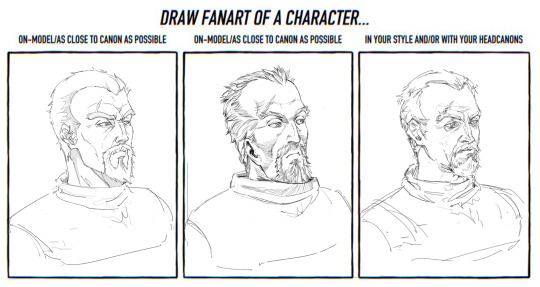
#vinland saga#askeladd#this game should be called “wanna see how much you’re woobifying this character without noticing?’’#embarrassing#I’m never doing this kind of exercise again it’s like when you say a word so many times it stops feeling real?#none or these feel real to me anymore#they’re all so wildly different it’s somehow insane to me#idk man I haven’t thought abt styles :tm: in many years#main takeaway is fuck the anime style all my homies hate it#give yukimura a goddamn award for using line weight and angles? like a normal person?? wow!! what a fucking concept!!!#my asky looks fucking unhinged love that for him#it’s that kind of day#why does he also remind me of my grandma a little#anyway cool 10/10 would not do again would not recommend#absolute mindfuck of an activity#my art
63 notes
·
View notes
Text
fun scene idea that I’ll probably never get around to drawing: someone grabbing a wanted poster from a board or wall only to reveal a missing persons poster featuring the same person as on the wanted poster underneath it (also the reward for them as a wanted person is higher than the reward for returning them when they were missing)
#basically this is something fun I imagine for my oc cashmere#as of right now she’s simply missing (presumed to be kidnapped at least that’s what the family she is from told people)#as of rn in her story she isn’t wanted for anything but that can change I’ll probably have her (attempt to) commit treason against her#own family or something#I think it would be fun that her family is willing to spend less when she’s missing than when they’re mad at him and want him back to be#punished for angering them#I have attempted to draw this out before but was like#it would be better as like an animation tbh but#I can’t animate I’m not going to animate my tablet does not even have the storage for me to animate#maybe a quick animatic if anything but like#idk#it’s more of a fun idea than anything#I imagine what leads to cashmere committing treason is that upon being back in the hands of their family they begin to realize that they#can’t lie to theirself anymore their family is terrible and the reason they died in the first place and snaps#i feel like they found themselves in a situation where they attacked someone out of fear and rage and blah blah that is seen as treason#it would probably be his dad that gets attack im ngl conquest deserves it#or they accidentally hurt them out of fear#I am unsure#*shrug emoji* I’m just making up shit for cashmere as I see fit and per what I find most interesting and fun <3#also cashmere is my only oc rn who would have both a missing and a wanted poster#sure most of my ocs would find themselves wanted for one reason or another or targeted by others#but some cashmere is useful as a tool to their family and having a runaway child is bad for their reputation they’d ofc want her back to#keep her quiet and keep people from finding out that she ran away#they also still think she’s sickly and wouldn’t want anyone to find out who she is that she’s sickly and for word to spread#basically they want cashmere back so their reputation isn’t damaged and so they can go back to using her as they please#I put a lot of suffering into this character#and I will continue to do so because as my favourite this is what happens#sorry I’m babbling
32 notes
·
View notes
Text
Here are the Thoughts™️I promised @discordkittenterumi
This post is a much longer follow to this post from last night as I was listening to episode 60.
This post is also in conversation with with something @peppedstep mentioned about Neil’s loyalty to the coterie, which I touch on briefly.
Everything sort of solidified in my brain after finishing 60 at like 2 am last night.
In 60, we see Neil wake up in a strange place with Weathers and Amara with him. The last thing he remembers is running from his sire which seems to be several days ago.
Neil also does not remember much of Baghdad (which is a whole separate post that is coming. I have many thoughts about Nara and Neil in that situation).
He routinely has panic attacks, some of which lead to dissociation. For example, before his trial in 37 and 38, we see him go catatonic when he realizes his haven is under attack. Dissociation is not usually something that happens to someone once and then never again. It’s a coping mechanism, and I don’t think it’s a stretch to say it’s something he experiences, perhaps not regularly, but with some sort of frequency.
In addition, many of his rituals require his mind to be separated from his body, and we know kalif also impacts his cognitive function as also seen in Baghdad. He has the capability of astral projecting which leaves his body behind, defenseless. The ritual with the bull in 6, he had others stay nearby just in case something were to happen. The second time he completes the ritual, Johnny escorts him.
Neil is often dependent on the people around him to keep him safe, and we see him repeatedly look to others for their judgement before he makes a decision on his own. He looks to Nara to trust Jubair, and he looks to Amara to trust Catherine and this mission. In these two cases in particular, he’s forced to rely on others’ assessments of the situation because he cannot make his own. In addition, relies on Britta and Miles to defend him in court while Johnny and Wynn take care of his haven. He also places an immense amount of trust in the coterie and their decisions, generally speaking.
Peppedstep mentioned that family is important to Neil, the coterie is important to Neil. He consistently revolves around the idea of keeping them together and spending their final nights together. I agree, but to add another layer to that, Neil trusts everyone in the coterie, and as has often been discussed, trust is an extremely rare commodity for Kindred, and in some cases doesn’t exist at all. What Neil has with the coterie almost seems to be unprecedented given the general picture of the Camarilla and Kindred society the audience is presented with. He knows these people will protect him and/or his body when he is unable to.
I would imagine, without them, his quality of life would be diminished, and all it would take is one mistake, one bad episode, for him to meet final death or another horrible fate, especially considering his abilities. It was a stroke of luck that Amara and Weathers picked Neil up.
His drug use, mental health issues, and magical abilities all work closely together to form a complex web of memory loss and a distrust of his own opinions. Even further, I would argue that his memory loss contributes to his lack of a sense of identity.
I believe it’s been mentioned a few times that Neil doesn’t really have a strong sense of identity (I am not going to sort through all 60 episodes to find those sources though, sorry! I do think it might have been brought up at the party when Fester was preparing him?), and that’s proven by how he talks about his worth early on when Wynn confronts him after the bull ritual. He, and I am paraphrasing here, believes he is useful because he can provide the coterie with knowledge. Later on, he mentions that Miles kept him around because of his specific abilities which again, his worth is tied up in his usefulness to people.
This mentality is compounded by his early history with his sire. In 51 or 52 (I can’t remember which and I’m not going to look it up), it’s described that Neil looks at his sire the way one might look at an abusive parent. Neil is absolutely terrified of this person even now. Based on Neil’s nonconfrontational personality, some of his coping mechanisms in the face of this abuse could easily be making himself small, agreeing with his sire, etc. leading to the people-pleasing nature we see in Neil now. Peppedstep also posited that Neil could have been Embraced to be made in his sire’s image. We know he is a loner, we know he has visions, and maybe he also feels the need for family in his own demented way. Regardless of if that is true, Neil’s sire had a massive effect on who Neil became as a Kindred and without question would influence his sense of identity. If Peppedsteps’s theory is true, then Neil’s sire would have stripped away any sense of who he was to remake him in his image.
TLDR: Neil has memory loss from a combination of drug use, mental health issues, and magical abilities which make him reliant on others for his safety in certain circumstances and further exacerbate his lack of a sense of identity.
Thank you for coming to my ted talk.
#path of night podcast#pon meta#neil foster#i feel like the red string meme or the you didn't connect shit meme#if anyone has additional thoughts pls share!!! i love reading everyone's stuff!!!!#i have no solutions only problems here#and even if neil doesnt dissociate often u can pry that headcanon from my cold dead hands#and i really do have another insanely long post about neil and nara and the kalif and consent#it is just not ready for public consumption yet#also i read this like 5 times so im sorry if there are any typos its not words in my brain anymore
29 notes
·
View notes
Text
au where miles gets arrested yet again and phoenix has to prove his innocence yet again in court. while in the middle of the trial, he gets stuck and can’t figure out how to prove his friend’s innocence.
he’s just about completely given up mentally when he hears a voice telling him not to keep going and that he can’t give in yet.
phoenix looks over, expecting that it’s maya channeling mia, and is shocked to see who it is.
maya is channeling someone… but it’s miles’ dad, gregory. he showed up to help phoenix, not wanting to see his son to be put in jail for a crime he didn’t commit.
with the guidance of gregory, he’s able to prove that miles is innocent and figure out who actually committed the crime. after the trial, miles and gregory have a talk that they desperately needed to have, and miles is finally able to get some closure.
#ace attorney#ace attorney au#miles edgeworth#phoenix wright#gregory edgeworth#i just love this dad and son a bunch :((((#I feel that we were robbed of never getting gregory being channeled (if that’s the right word idk anymore)#also miles rlly needs closure and to have a talk w his dad fr#like it doesn’t even need to be in a case itd also be nice for maya to like volunteer to do it to help miles after all he did to help her#and all he did to help nick#gregory would be so proud of his son :((((#I need them to hug!!!!!
357 notes
·
View notes
Text
Lately I've only been wishing to grab a comic about my favorite character and just have a genuinely good time reading it.
#I can't remember the last time I took a Deadpool comic and genuinely had a good time about it#I hate the direction they took with his character and it's so disrespectful that I don't even talk about I don't even think *any* Deadpool#fan genuinely talk about it because were so tired of his kids characterization we all just collectively decided to ignore whatever hell#marvel through at him#but rant aside#it's just–#I am not sure if comic books are fun anymore I don't even know who I am making content for half of the people on my notes haven't touched#comic book and aren't pretending to do so#people who read the comics tend to be so mean or bitter about it that even if you follow most will be angry about something#comic or fan related and I don't know if I can blame them but following that is draining#and as much as I was trying to be a good sport about it you make a post about comic book characters and#and the overwhelming response is 'I don't read the comics but'– following up by a take about them that doesn't even recognize any core#aspect of their personality that you can't even grasp you can't even recognize them#you can't recognize them on tue cannon you can't recognize them on the fannon#and no matter how engaging you try to make content about the fandom people just–*refuse* to read it. And then– they *refuse* to tag fannon#content as fannon#and *refuse* to leave either#Yes we are all having fun but how can a character tag be so so filled with people who have no idea of who they are#how can a character can be properly loved and take care of and have content that respect them if no one makes any attempt to *know them*#and it's disheartening because *comics* are supposed to be fun *fannon are supposed to be fun*#but for aome reason it's really *really* hard to have fun here anymore#I created this page to share my love for the characters I care about and see more content of people who care about them too#but I can't even *find* people who care about them any more and when I do they're all so angry and upset– And I *cant even blame them*#I just... I don't know why I am doing this anymore or for who I am doing this anymore#sorry to vent but it's been a while since I haven't been had a genuinely good time™ enjoying comics#I don't think even people who write those comics enjoy those comics or care about those characters#Sometimes feels like everyone is projecting on those characters rather than *writing about them*. And I can't find them anymore#fanfics used to be about love petters to characters who you love#nowadays seems like a competition to see who makes more funny words with tropes pre-written since 2007#vent
34 notes
·
View notes
Text
something I’ve been thinking abt is how many people think Makoto is immune to despair. I don’t think he is. I think becoming the ultimate Hope was BECAUSE he felt despair. He wouldn’t have fully reached that point without Junko. Makoto becoming such a beacon was his last attempt to avoid completely falling and it wasn’t because he didn’t feel despair, it was because he was too damn stubborn to allow everything to go to waste and he refused to sacrifice his beliefs for someone else’s. His inner monologue tells me he DID experience the same new low the other suvivors did in the final trial, but at the point where he had the choice to give up and die, he looked at the others and he looked at Junko and he couldn’t allow it to happen, not out of self preservation, but because the idea that Junko would have control over their lives made him FURIOUS. and that utter refusal to die kicked in, wether luck or otherwise, and he made the concious effort for one last push while something in him was breaking. He had to be broken in order for the Ultimate Hope to come through so aggressively, bc it could only exist in the face of the Ultimate Despair. He snapped the same way she did, but in the other direction. In what could have been his final moments he chose to embody everything Junko wasn’t, and every single optimistic and luck fueled ideal in him suddenly charged forward and pushed him. It was a combination of the final straw and a choice. Makoto isn’t immune to feeling despair, he’s just too stubborn to fall into it of his own volition. I think that’s why I like that scene in DR3 so much. People were SO SHOCKED Makoto actually fell for the tape, that he actually became despair for a moment. I saw people getting mad or disappointed, saying it was pathetic and Makoto seemed to fall from some sort of pedestal for them. Honestly part of me wonders if that sort of mentality, which clearly people had in universe, affected Makoto a bit. Like he started to see himself as less of a person, subconsciously. Prompting him to take more risks, less self preservation, act way more bold. It seems he has to be reminded a lot not to put himself in danger by his friends, to not do something too reckless. All over the place I would see in regards to that scene either this frivolous ‘oh this was just angst drama with no meaning behind it’ or ‘he can do better than that. he’s so weak’ or ‘come on, there’s no way he’d fall into despair, he’s the Ultimate Hope!’ This kind of mentality, which was kind of ironic considering Ryota was there the entire time saying the same thing and treating Makoto the same way. Like Makoto was superhuman. Like Makoto didn’t feel despair the same way ‘normal people’ did. In a way that was also how Munakata saw Makoto. Makoto stopped being a PERSON to the world when he became Ultimate Hope, he became a concept, a belief system, much the same way Junko ascended beyond herself. But the difference is that treating Makoto that way is the opposite of the reason Makoto became such a representative for hope. He wasn’t doing something no one else could. He was doing something everyone had the chance to, he just… was a little more optimistic, a little more stubborn, a little more ‘gung-ho’ about things. He just took the lead where no one else did, where no one else knew they even COULD in the face of Junko’s unstoppable force. She had overcome the biggest threats and obstacles in the world, what could one person do? And the answer Makoto found was, anything. Everything. It doesn’t all rest on Makoto, he’s just the one that was inspired to try to do what seemed like the impossible. But as evidenced by the change in his friends after that trial, it’s clearly not something only Makoto is capable of. The others pulled out of despair thanks to Makoto, but it was their choice to do so.
“But… this world is so huge, and we’re so small. What can we do…? No, we can probably do anything. Yeah! We can do anything!”
#makoto naegi#Danganronpa character analysis#Danganronpa#danganronpa thh#danganronpa future arc#I fucking love Makoto Naegi man.#I think there’s a fine line of nuance to Makoto that’s easy to miss bc he doesn’t really make it known#he’s not a pushover and he’s not overpowered. he’s a people pleaser but he will say what needs to be said#he’s an immovable object and the exact opposite of Junko but he’s also just a normal guy who’s optimistic and (un)lucky#he isn’t invincible but he has immense power to his words the same way Junko did#if anything his superpower is being kind above all else. he’s compassionate to some of the worst people in the world.#he was even conpassionatr to an extent to Junko. he didnt want her to kill herself despite everything she’s done#and he still acknowledges that for years she was a classmate and friend.#I do think the more he learned abt what she did the more he’s come to actually hate her though#post the first game he always refers to her without a suffix to her name which is one of the most subtle rude things you can do#it means you have zero respect for the person you’re referring to#and he speaks about her with some venom he doesn’t use for anyone else in the future arc#he’s not incapable of feeling negative emotions#I really liked the future arc scene bc it showed that Makoto DID experience enough despair to have overcome him if he didn’t refuse#and that it still affects him deeply. people treat him like he’s either this perfect ideal Chad or this baby chick who’s so delicate#and no one really focuses on how makoto shoulders so much and yet is still vulnerable.#honestly that guy was DUE for a mental breakdown even without the tape. it would have happened eventually#I actually wrote one based on him finally hitting a breaking point after giving so much of himself away and keeping nothing for himself#that his issues that he shoves down constantly finally can’t be held down anymore. Hajime helps him bc he knows how that feels#it was a LONG time ago that I wrote that but honestly if I can remember where i was going w it I might finish it#it was initially an rp but I could make it a fic#anyway. the point is Makoto is SO much more complex than people give him credit for#the most fundamental thing about him is that he’s normal and that’s ok! that’s what helps him rise!
52 notes
·
View notes
Text

#project moon#limbus company#I beat canto 6#canto vi spoilers#canto 6 spoilers#this face is how im feeling after it#it didn't hit me with a strong feeling of wanting to cry like canto 4 but#i cant really put into words how it got me feeling#I will say though this canto is good#really fucking good i do not know how the fuck project moon does it but they keep doing it#it did make me feel bad for using sunshower though i feel i shouldn't put him though that anymore im sorry heathcliff#in fact sorry to all the sinners for using any negative sanity id's#even though no spoilers here i just wanted to tag it anyway
38 notes
·
View notes
Text
i hate that im scared to write and i hate that im so picky with fics bc i have very specific needs to be fulfilled and it is hard to meet those needs...
i soooo bad desire zolusan, post wano specifically bc in my head thats when all three get together. wci is when sanji realizes his feelings for luffy– or rather accepts that he is in love with him (two years of pining im so sorry sanji) that and also finding difficulty in accepting his feelings for zoro too so basically: sanji being a mess
but idk zolusan mutual pining but they're all idiots. sanji has his own struggles, but imagine zoro's feelings or luffy's feelings. zoro keeping them internalized because it's not that important and wouldn't change a thing, yet he yearns. luffy... the guy is unpredictable imo. and i think that focusing on his perspective would be a lot of fun. he's already happy with what he has but he wants to be selfish and ask for more. idkidk words are hard but these three live rent free in my brain and they do not want to leave send help
(ALSO. imagine discussing the death pact and luffy finding out about it... unrelated to what i said but im talking about zolusan can u blame me... like. God!!!!!!!!!!! theres this one fanart where zoro does go through with it and luffy finds out and. Sighs.)
#zolusan#zosanlu#zolu#lusan#zosan#im having brainworms for monster trio#monster trio#monster poly#come back to me.....#one piece#tin talks#random but i often think about how sanji doesnt kick luffy anymore#i think about that so much#seriously when was rhe last time he did#im gonna live myself#i hope by the time egghead arc ends#there will be more zolusan fics that relate to post wano and egghead#or maybe just post wci in general#or maybe i just need to explore more stuff outside canon#i do love aus but also i need Feelings#my fav zolusan flavor tbh is pre established zolu#and then sanji realizing his feelings 'late' and doesnt want to interfere with what zolu has#vs zolu noticing but is just waiting for him#UGHHFJAHDKHW i love these three#WELL sanji not kicking luffy since wci would be the correct wording but. Still#LIKE. IN WANO HE JUst sTOPPED HIM WITH HIS PRECIOUSHABDS#DO U DXPECT ME TO BE NORMAL
39 notes
·
View notes
Text
questioning sexuality is so exhausting
#(edit: sorry for the rant in the tags and i just. i want someone to talk to me)#i keep on doing it for no apparent reason#someone was talking about lust yesterday and i realised today that.#even tho id thought i don't experience it. i possibly do. but exclusively towards women.#i hate it here!#for a multitude of reasons i will never have a relationship with a woman but! i may be incapable of having a relationship with a man!#at some point in the last few months i have abruptly pivoted from definitely wanting marriage and kids to being ambivalent on marriage#and not wanting kids. that's such an outlier in my life that it might just be a mental health thing tho idk#but at the same time i. want to be loved.#i don't know what i want anymore and im tired of questioning myself#i definitely overthink it but idk how to stop it#and i hate hate hate how the moral obsessions have bee lately#this isn't entirely related but it kind of is#like Am i a terrible morally bankrupt person for having certain thoughts or is it just religious ocd go brrrr?? am i overthinking it?#i don't know. i don't know!#for a while labelling myself as arospec ace kinda calmed that down but. i don't know#i do't want to be attracted to women. i don't want to have to look away so often. i don't want any of that.#but i don't know how to stop it.#i don't even know if i'm attracted to men at all.#this is a cry for help and encouragement and prayers no matter what your views on these matters are#queer stuff tag#i nearly fessed up to my friend yesterday about same sex attraction and i might've except that it would have probably outed me as#the person who anonymously sent in a question several months ago about the side b movement to a church thing#ive only told one person at church about any of that sort of stuff and it was very vaguely worded#also see: this friend is the mother of the boy i?? i don't even know how i feel about him#i increasingly think it wasn't romantic at all. but i don't know#i would love any encouragement you got. anything at all.#i don't know how much this stuff is affected by the fact that i consider myself unloveable and think it highly unlikely any boy will ever#care for me#now im rambling. sorry
24 notes
·
View notes